VETAFFAIRS



On 2 December 2024, the Government responded to Final Report of the Royal Commission into Defence and Veteran Suicide, accepting the overwhelming majority of its recommendations.
The Government agreed or agreed-in-principle to 104 recommendations, noted 17 recommendations, and did not support one recommendation in part. The Government response is available on the DVA website.
In responding to the Royal Commission’s Final Report, the Prime Minister, the Deputy Prime Minister and Minister for Defence, and the Minister for Veterans’ Affairs and Minister for Defence Personnel acknowledged the size and complexity of the tragic issue of Defence and veteran suicide, and the Government’s resolve to address it.
The Government’s response marks the beginning of a substantial and long-term program of reform across Defence, DVA and the veteran support system.
The Government will establish a new Defence and Veterans Services Commission – a new statutory entity to oversee enduring and systemic reform. The Defence and Veterans Services Commission will provide independent oversight and evidence-based advice to improve suicide prevention and drive better outcomes for serving and ex-serving ADF personnel. An interim head will be appointed as soon as possible to work across Government toward the establishment of a legislated oversight body by 2025.
To support the implementation of the Government’s response, a Taskforce will be established within the Department of the Prime Minister and Cabinet, drawing on expertise from across Government, to consider matters of detailed implementation.
The Government has also provided funding to DVA to co-design with the veteran community a new agency focused on veteran
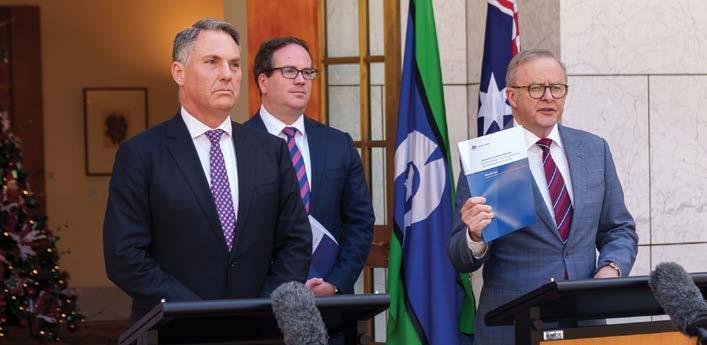
wellbeing to be established within DVA (recommendation 87), and to continue consultation on a new national peak body for ex-service organisations (recommendation 89). This work will begin soon.
The Government has already acted on the Royal Commission’s Interim Report, including:
• introducing legislation to simplify and harmonise the veterans’ rehabilitation and compensation system
• eliminating the backlog of 42,000 unallocated claims identified by the Royal Commission
• improving the administration of DVA claims systems, including through streamlined medical forms, the introduction of claims-screening teams, and improvements to the MyService portal
• improving access to information held by DVA and Defence.
Since the Interim Report, the increased rate of DVA decision-making enabled by additional departmental resourcing has supported a significant increase in the entitlements paid to veterans and veteran families. The 2024–25 Budget included an additional $6.5 billion for income support and compensation over five years from 2023–24 through to 2027–28, of which $2.2 billion was paid in 2023–24.
Along with the Government response, Defence and DVA have released the Exposure Draft of the Defence and Veteran Mental Health and Wellbeing Strategy.
Consultation on the draft opens early 2025 for a 6-week period. You will be able to provide feedback by answering specific questions in the exposure draft survey or uploading a written submission in the submission portal. More information is available on the DVA website (See the article on page 5.)
The Government has also released the Veteran Transition Action Plan to accompany the Veteran Transition Strategy launched last year, supporting our serving men and women as they transition from ADF service to civilian life. (See article on page 5.)
DVA acknowledges all those who contributed their invaluable lived experience and insights to the Royal Commission’s inquiry. We are committed to making the most of this opportunity to achieve meaningful change and improve the wellbeing of Australia’s veteran community.
Always call 000 for support in an emergency.
Open Arms – Veterans & Families
Counselling is a national service that provides free mental health and wellbeing support to anyone who has served at least one day of continuous fulltime service in the ADF and their immediate families. Open Arms is available 24/7 call 1800 011 046 or go to www.openarms.gov.au


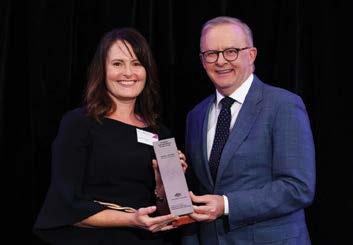
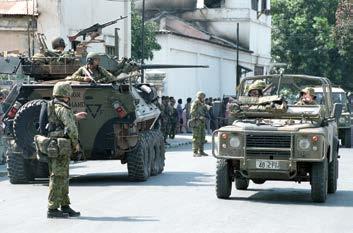
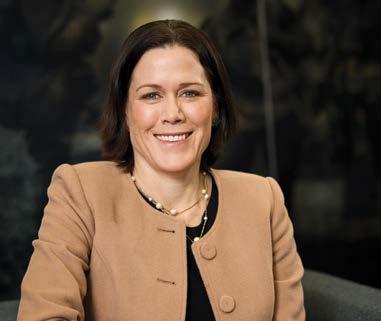
Alison Frame Secretary, Department of Veterans’ Affairs
The Government recently released its response to the Final Report of the Royal Commission into Defence and Veteran Suicide.
The response outlines significant reform across Defence and the veteran support system. DVA is committed to enacting the Government’s response and delivering on the recommendations accepted by the Government.
The Government has agreed or agreed-in-principle to 104 of the Final Report’s 122 recommendations. It has also noted for further consideration 17 recommendations. Working through those recommendations, many of which intersect one another, will take time, especially as we will need to work closely with other agencies and the veteran community.
The Government’s response is a blueprint for reform to not only address suicide and suicidality in the veteran community, but also to improve veteran wellbeing in many other areas.
It provides clear direction to the Department on priority work for the years ahead and marks the start of a new chapter in how DVA supports the veteran community. The Department has undertaken significant preparatory work so that it is well placed to quickly enact the Government’s response and we now look forward to getting on
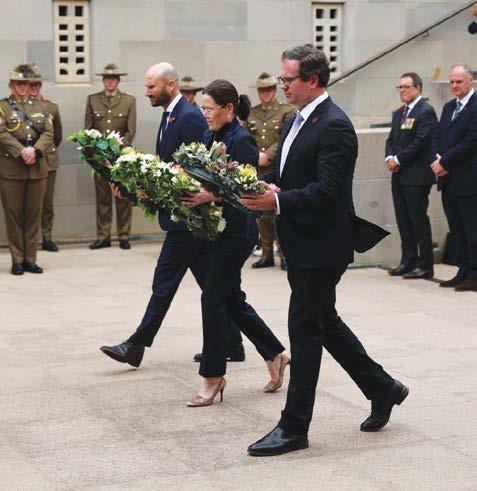
with the job so veterans and veteran families are better supported now and in the future.
DVA is on a journey of continual improvement to the way we work and 2024 has seen some significant developments in this regard.
With more than 81,000 women in Australia who have proudly served in the ADF, I am pleased to share that we have started work on a Women Veterans Strategy. We know that women veterans can face issues accessing support services in a system traditionally designed for men. Building on the important insights of the Women Veterans Policy Forum and the national gender equality strategy, Working for Women , DVA is looking at ways to tailor and improve our support and the way we work for women veterans.
There are some other innovations on which I am pleased to provide an update.
In October, the Department began a 6-month trial which allows radiologists to claim MRI scans for eligible clients referred by a GP without needing to seek prior approval from DVA. This reduces administrative burdens and wait times.
DVA has also significantly improved our timeliness in processing Household Services and Medical Compensation assessment invoices from service providers following increased levels of demand. From 30 September, we transitioned all providers to the online Provider Upload Portal and then implemented significant enhancements to the portal, which now receives over 90 per cent of invoices, allowing DVA to process all invoices in under 20 days.
In another example of innovation, the Claims Lodgement Support Model is now in operation at 5 locations (ESO centres) in Western Australia. In early 2025, an online model will be in operation via the Woden Valley Veterans’ Support Centre. This work to date has delivered positive outcomes for veterans and ESO advocates and has strengthened the relationship DVA has with ESOs and their members. We are looking forward to expanding this approach to other states and territories in 2025.
In partnership with ESO groups, we have commenced this scalable model, under which experienced DVA claims processing staff work directly on site in ESOs with advocates, veterans and families to help them prepare and lodge their compensation claims with DVA. The work of the model assists veterans to better understand legislative requirements, lodge more complete
Vetaffairs is published by the Department of Veterans’ Affairs as a free newspaper for Australia’s veteran community.
Editor: Martin Blaszczyk
email: vetaffairs@dva.gov.au
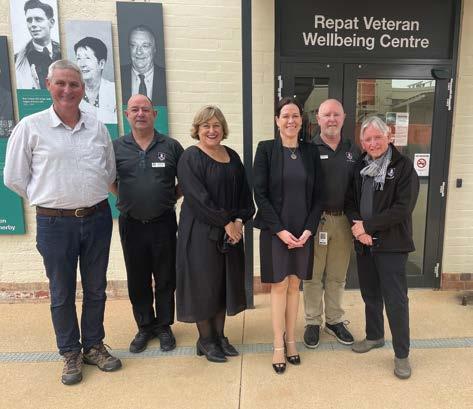
claims, and informs veterans of the steps used to determine claims.
In a further initiative, DVA has teamed up with RSL Queensland to facilitate advocate and delegate information sharing sessions in Brisbane, Townsville, Sydney, Hobart and Currumbin. DVA claims staff engaged with advocates from a variety of ESOs to discuss topics such as the claims process, the role of Claims Support Officers, Incapacity Payments and Special Rate Disability Pensions. The feedback has been very positive and we are considering locations for future sessions.
I am also excited that DVA is including 4 ADF members, 3 veterans, 1 veteran family member, and 2 Gallipoli Scholars or 2 Sir John Monash Foundation Scholars, as part of the teams delivering the 2025 Anzac Day services at Gallipoli in Türkiye and near Villers-Bretonneux in France. Selection of the veterans and veteran family members who applied through an Expression of Interest process is underway and will be finalised shortly. This initiative is a first for DVA and will provide an opportunity for veterans to directly participate in commemorative events overseas.
As 2024 draws to a close, I thank you for the assistance you have provided to the Department this year. I think we can be proud of what we have achieved together. I wish you all a very happy Christmas and a wonderful New Year. Have a restful break and I look forward to working with you again in 2025 to continue and expand our efforts to improve the services and support we provide to the veteran community.
mail: GPO Box 9998 Brisbane, QLD 4001 Follow DVA on Facebook, Instagram and X: DVAAus Browse DVA on YouTube.com/DVATVaus
If you have an enquiry for DVA phone: freecall 1800 VETERAN (1800 838 372) web: dva.gov.au


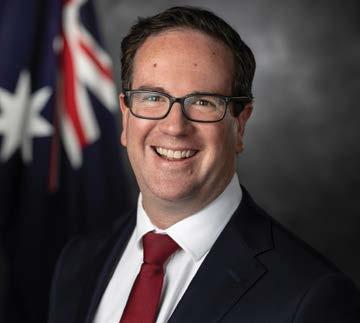
The Hon
Matt Keogh MP Minister for Veterans’ Affairs and Minister for Defence Personnel
The rate of veteran suicide in Australia is a national tragedy, one that none of us can ignore.
The Royal Commission’s Final Report made it clear that across decades and successive Governments, veterans and families have been let down. The harrowing stories we’ve heard over the last 3 years from personnel, veterans and their loved ones has made this an undeniable fact.
Stories like these were why we pushed for the Royal Commission and why from the moment the Report was handed down, we have made clear it would not be left to gather dust on a shelf.
Only days after the Royal Commission completed its work, I committed on behalf of the Government to respond in full before the end of the year and that we would establish an oversight body.
We have now delivered on that promise.
On 2 December, the Prime Minister, the Deputy Prime Minister and I released the Government response to all 122 of the Royal Commission’s recommendations. Government agreed or agreed-in-principle to 104 recommendations and further work will be done on the other 17. Only part of one recommendation was not accepted.
This response is a continuation of the most comprehensive and enduring reform of the culture, systems and processes supporting Defence personnel, veterans and their families ever undertaken.
It’s an historic moment, that will see real change inside Defence and DVA, to ensure veterans and families get the support they deserve, now and into the future.
The first step will be the establishment of an independent body to oversee these reforms, as


recommended by the Royal Commission – the Defence and Veterans’ Service Commission.
The Government will also provide funding to DVA to work with the veteran community on the design of a new agency focused on veterans’ wellbeing, and to establish an Ex-Service Organisation peak body.
Thank you to all those who came forward and bravely told your story to the Royal Commission. Your courage is driving the change needed to save lives.
Now the rubber truly hits the road, as we work to implement recommendations as swiftly as possible. I’ve heard the calls for urgent action from the veteran community and the Government’s response is a clear direction to Defence and DVA of our intent to deliver.
To follow what the Australian Government is doing in response to the Royal Commission’s Final Report, visit the DVA website: www.dva.gov.au.
As 2024 draws to a close, I wanted to take the time to reflect on some of our achievements this year.
We cleared the backlog of compensation claims defined by the Royal Commission a month early, and while the number of claims being made have continued to increase, thanks to the hard work of DVA staff, backlogs have not re-emerged. Now MRCA Initial Liability claims are being determined on average in less than 90 days.
We’ve streamlined medical forms to make it simpler for medical professions and advocates to

assist you with your claims and we’ve enhanced funding for veteran home care.
And much more.
Finally, we have been assured by the Opposition that they will support passage of the Veterans Entitlements, Treatment and Support (Simplification and Harmonisation) Bill (the VETS Bill) in the new year to deliver on the first recommendation of the Interim Report of the Royal Commission.
It’s been a huge year and next year will be even bigger.
I wish you a merry, healthy and safe Christmas. MK
I have been a compensation advocate of 10+ years, both paid and voluntary. In my region of the Wide Bay Burnett Queensland, it is now evident that veterans and families who are Gold Card recipients have little knowledge or are unprepared for the effects of transitioning between DVA and My Aged Care.
So many people in the baby boomer demographic think the Gold Card will carry themselves and family to end of life. Whilst many entitlements continue on or are cross pollinated with Aged Care, there is a misunderstanding
of what happens when independence becomes dependence.
I ask the Department to start an education roll-out, starting with the periodical, then website and brochures, to advise clients on preparation, or at least advice, to enable a direction towards this reality. ESOs are seeing veterans and families daily who have no idea or understand on what both Departments’ [including Health and Aged Care – Ed] role is when dependence is lost.
Regards
Lex Roberts
Thanks for getting in touch with your helpful suggestions, Lex. DVA has established an Aged and Community Care Taskforce and we are working on additional resources to help veterans, war widow(er)s and their families understand DVA services and supports, and how these can be accessed alongside My Aged Care supports and packages when living in residential aged care. Information and resources will be published on the DVA website, and available online and in hard copy early next year at www.dva.gov.au/ac.
– DVA
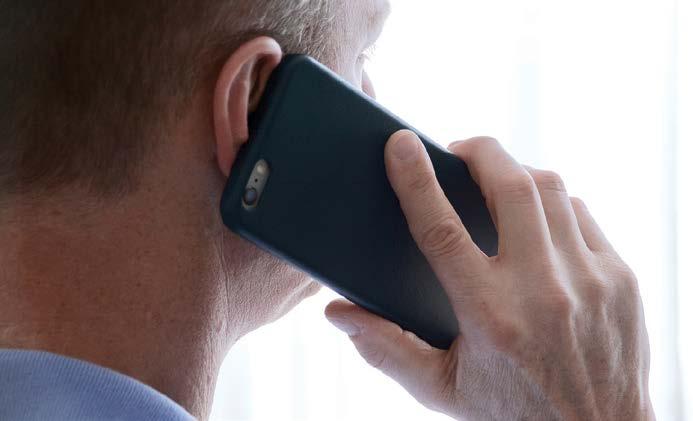
Scammers are criminals who manipulate and deceive you into giving them your money or personal information. Common scams include ‘too good to be true’ offers, fake goods and services (especially online), and callers who impersonate people or representatives of trusted organisations.
Scammers like to exploit our festive mood during the holidays and take advantage of people who are often busier than usual, and on the lookout for the perfect gift.
DVA is encouraging everyone to make yourself a harder target for scammers by staying up to date on the latest scam alerts on the Scamwatch website: www.scamwatch.gov.au.
You can follow these 3 easy steps to avoid falling victim to a scam:
1. STOP – Don’t give money or personal information, including your DVA client number, to anyone. If you are unsure, say no, hang up, delete. Don’t click on links that are offering you free products or services.
2. CHECK – Scammers pretend to be from organisations you
know and trust like MyGov, your bank, the police or government. Sometimes these people may also pretend to be health professionals or ex-service organisations. If you’re not sure, call the official phone number of the organisation to check.
3. REPORT – The more we talk, the less power they have. Report scams to www.scamwatch.gov. au when you see them.
To help you stay up to date on the latest scams, you can also subscribe to regular scam alert emails from Scamwatch.
Keep your personal and financial information safe and say ‘bah humbug!’ to scammers – so you can enjoy the festive season with your family and loved ones.

Whether you have served in the ADF or know someone who has, all Australians are encouraged to have their say on the draft Defence and Veteran Mental Health and Wellbeing Strategy 2024–2029. The veteran community was consulted late last year, and now members of the Australian public are invited to share their thoughts.
The strategy aims to improve the mental health and wellbeing of the Defence and veteran community. It is being jointly developed
by DVA and Defence to guide how the government provides support to current and former ADF members and is set to be finalised later this year.
The consultation will open in early 2025 for a 6-week period. You will be able to provide feedback by answering specific questions in the exposure draft survey or uploading a written submission in the submission portal.
Anyone can participate in the consultation, including veterans,
current ADF members, and families, plus organisations that have an interest or role in supporting the Defence and veteran community. Your feedback will help inform what is important when it comes to supporting the mental health and wellbeing of our Defence and veteran community.
For more information, please visit the DVA website. (Search for ‘Defence and Veteran Mental Health and Wellbeing Strategy’.)
Transitioning from ADF service to civilian life can be challenging, but it also presents opportunities for new connections, personal growth, success in civilian careers and new interests. The release of the Veteran Transition Action Plan marks another step in improving the transition experience for veterans and families.
The action plan sets out more than 60 actions in support of the Veteran Transition Strategy, released in August 2023, which provides a shared vision to prepare and support veterans and families transitioning from ADF service to lead fulfilling civilian lives. The actions are identified against the following 6 priorities of the Veteran Transition Strategy:
1. Veterans and families plan and prepare early for their transition.
2. Veterans and families can access tailored support that meets their needs.
3. Families are actively engaged throughout the transition process.
4. Access to employment, education, and skill-building opportunities.
5. Financial wellbeing for veterans and families.
6. A sense of support and recognition for veterans and families.
The plan is a collaborative effort, developed with support from the Joint Transition Oversight Panel which includes the Department of Veterans’ Affairs, the Department of Defence, the Commonwealth Superannuation Corporation,
Services Australia, and the Department of Health and Aged Care. Extensive consultation and engagement with current and former serving members and family members, in addition to ex-service organisations, academic and industry experts, and Commonwealth, state and territory government agencies, informed the Veteran Transition Strategy and, in turn, the action plan. As actions progress, engagement and feedback will ensure the action plan remains a relevant and practical document. You can see the plan on the DVA website. (Search for ‘Veteran Transition Action Plan’.)
Veterans often seek higher education during and after their transition to civilian life to enhance their career opportunities. Many skills, abilities and experiences developed through military service are highly desirable and transferrable – however, these are not always readily recognised by education providers.
That’s where the Veteran Recognition of Prior Learning – Tertiary Support (RPL) Grant Program comes in. The program offers funding to universities to adapt existing tertiary credit-mapping frameworks, or establish or adapt direct, assisted entry and RPL pathways.
Under the RPL Grant Program, the Australian Government is providing a total of $1.65 million to Australian universities, offered over 3 grant rounds.
Recipients in the second round of the RPL Grant Program are University of Newcastle, Flinders University, University of South Australia, Charles Sturt University, Queensland University of Technology, and Western Sydney University. A total of $700,000 will be provided through this round.
For more information on RPL grants and other grant programs, or to receive notifications of future grant opportunities, visit GrantConnect
You can also find out more about Australian Government initiatives to support veteran education and employment on our Veteran Employment Program website.
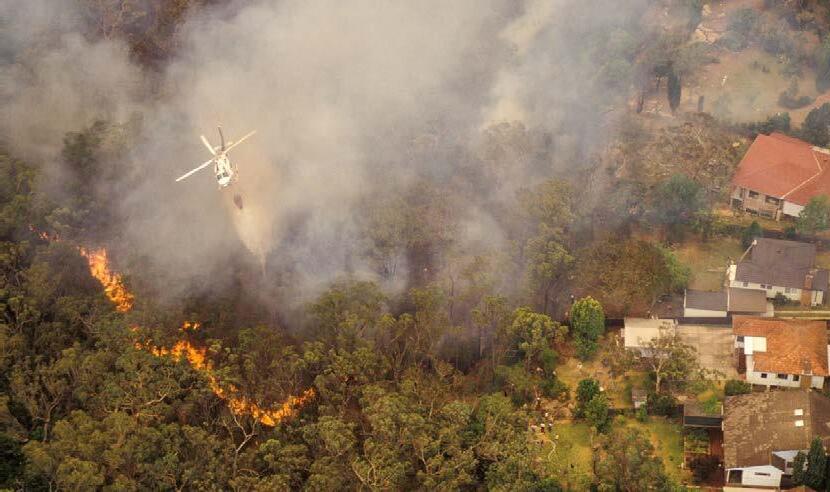
Some personal reflections on a year as Repatriation Commissioner
Kahlil Fegan DSC AM Repatriation Commissioner
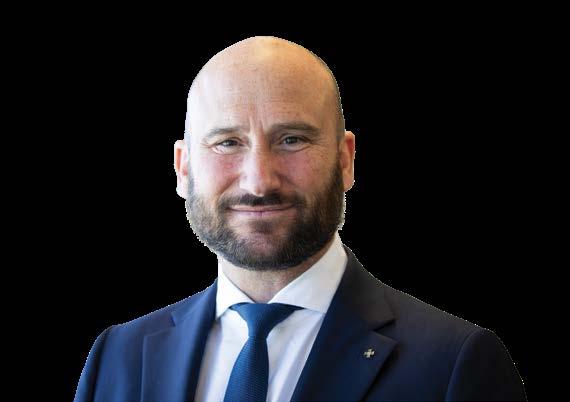
I write to you just over 1 year into my role as your Repatriation Commissioner and in continued appreciation of the opportunity to serve the veteran community. Noting this role has been in existence for more than 100 years, I believe these last 12 months have been particularly impactful in the veteran ecosystem.
We have seen new leadership engrain themselves at the head of the DVA and the ADF. The Royal Commission into Defence and Veteran Suicide has released its monumental findings and 122 recommendations. The harmonisation of our complex legislative systems is before the Parliament; and throughout, our veteran-related issues have featured dominantly in our media and social consciousness.
Whilst I have immersed myself in each of these matters, and many others, it is my learnings regarding why we have veteran related legislation that have been personally most impactful. Australia has veteran legislation because as a nation we made a commitment to support our veterans at the start of the First World War. As a country, we have honoured this commitment to varying degrees, and have arguably the most generous and comprehensive veteran support legislation in the world. But why is it comparatively so good?
In its infancy and as engrained in the Australian Soldiers’ Repatriation Act 1920–1941, our young nation’s intent was to support our detrimentally impacted veterans and families by giving them a ‘leg up’. To give those who were wounded the ability to work. To support a widow to raise the next generation, provide a farm to a veteran to help feed a growing nation. It was about recognising the value of veterans and investing in them and their families so that they could continue to support Australia.
Our veterans represented the best of our young workforce and we needed them – during time of war, and afterwards. Hence, not only was our legislation an obligation, in many ways it was an investment in our country’s future. This is, I believe, why the basis of our legislation is comparatively so good.
My other learning has been about the immense value of our volunteer service organisations and the role of society. Here I have encountered and worked with hundreds of outstandingly wonderful people, deeply committed to supporting those in need and filling what will be an inevitable gap between what Government can do and what a veteran may need.
I cannot thank and acknowledge these many people enough. I have seen them work throughout the night, donate their own money, and give up valuable family time to support others. I have experienced the impact these people and organisations
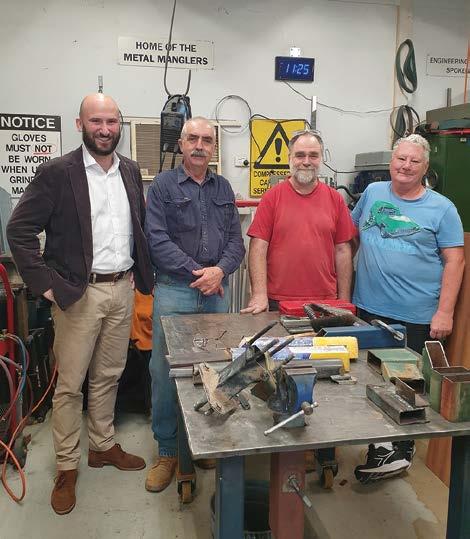
can have, particularly when they work in collaboration with DVA and others. It’s a beautiful thing and impressive manifestation of the commitment this nation made more than a century ago.
My third and final key learning regards our veteran challenges. The Department can only do what Government-endorsed legislation enables it to do. It can only spend money, award grants, and provide services in strict compliance with laws and regulations. This is life. DVA aspires to be ‘world’s best practice’ at that which it can do, and our society has an important obligation to do what DVA can’t. Here society and others must work in partnership with DVA in order to provide whole and connected support down to the local level. Much like at the end of the Second World War, Australian society needs to recognise the immense value of our large veteran community. Society must willingly seek to invest, to enable our veterans and families to contribute meaningfully, in big and small ways to our country. Yet unfortunately many in society see veterans as potentially broken, suicidal, needing welfare, angry and abusive. We know this is far from the truth but why do so many in the general community see us this way – as ‘Broken Diggers .’?
This disappointing and highly inaccurate depiction undermines our collective value and
compromises our reputation – none of which is good for us or Australia. Now, as our nation faces new security challenges, we have an opportunity to refocus and highlight the immense value of veterans – whether serving or not.
As a veteran community let’s more passionately celebrate and highlight veteran achievements. Let’s proactively reiterate that veterans are worthy of investment because they are professional members of our society who have received some of the world’s best training. They are experienced sailors, soldiers and aviators, non-commissioned officers and officers with a wealth of experience. They are successful business owners, accomplished public servants, and elders who can teach the young much about resilience and teamwork. They are valuable members of our society and should be invested in, not undermined. We should be celebrating the resilience and strength of Australian veterans and their families. It’s up to all of us. If we can improve societal perceptions, we will do much to reinforce the value for Australia of veterans, their families and service. Please – next time we see or hear of one of us who may be unwittingly undermining this message – can we encourage them to reconsider?
More importantly, let’s tell our story and demonstrate our strength. By doing so, society will be more inclined to recognise the merit in enabling a veteran and complementing between what Government can do and what a veteran or family may need. After all, this is why we as a nation made a commitment to support our veterans more than 100 years ago.
I recently made the decision to donate my brain to the Australian Veterans Brain Bank after my death. It is a highly personal decision but one that I hope will assist us to better understand brain disorders among veterans in the future.
During my military service, I was exposed to blasts, concussions and other traumas. I take the view that if I can do something after my passing to help ensure that the next generation of Australian veterans is better supported through increased knowledge of how service impacts them, then I should.
If you’re interested in pledging your brain, I encourage you to find out more information at: www.veteransbrainbank.org.au.
DVA will continue to provide support to veterans and families during the holiday season. However, please be aware that some services will be impacted.
The Open Arms – Veterans & Families
Counselling telephone line is available to support current and ex-serving ADF personnel and their families 24 hours a day, 7 days a week, 365 days a year. Phone 1800 011 046 toll-free.
Similarly, Safe Zone Support is an anonymous counselling line that is available 24/7, 365 days a year, to support members of the current and ex-service community and families. Phone 1800 142 072 toll-free.
Open Arms centres will be closed for the Christmas / New Year period from Wednesday 25 December 2024 to Wednesday 1 January 2025 inclusive, and will re-open on Thursday 2 January 2025. For further information visit the Open Arms website (www.openarms.gov.au).
DVA staff will be available to process transport requests for approved or compensable medical treatment. Staff will not be available on weekends or the public holidays of 25 and 26 December 2024 and 1 January 2025. If transport is required on these days and has not been pre-booked, you can pay for the travel and seek reimbursement when we re-open. Please call 1800 550 455 for assistance during business hours. Or, if you are an existing MyService user, you can make new transport bookings and review existing ones online. In a medical emergency, always dial 000.
DVA offices, shopfronts and general enquiry services do not operate over weekends or public holidays.
Over the Christmas period, they will be closed from 25 December 2024 to 1 January 2025 inclusive. This includes DVA’s General Enquiries phone line and our Veteran Access Network offices. These services will resume on Thursday 2 January 2025.
DSH Insurance and its advisors will be available for support with any insurance needs from 8 am to 5 pm on 27 December, and from 30 December to 31 December. Outside of business hours, and during weekends and national public holidays, calls will be diverted to DSH Insurance’s after-hours service partner, ensuring that support is available 24 hours a day, 7 days a week. For enquiries, or help with a policy or claim, phone 1300 552 662.
Online insurance enquiries can be made via the DSH Insurance website They will respond to you after the public holidays. You can also lodge a non-urgent claim via the online claim form
For DSH Insurance’s automated payment service, phone 1300 304 989 for the cost of a local call. This service is also available 24 hours, 7 days a week.
There will be no reduction in services across the Christmas/New Year period. Providers seeking prior approval for pharmaceuticals can call the Veterans’ Affairs Pharmaceutical Advisory Centre 24 hours a day on 1800 552 580.
The last pension payment in 2024 will be moved forward to Tuesday 24 December to ensure payments are received prior to the Boxing Day public holiday. The first payment of the new year will be Thursday 9 January 2025. See ‘Payment dates’ section below.
The incapacity payment that would ordinarily be paid on Thursday 2 January 2025 will be moved forward to Tuesday 24 December 2024. The next payment after this will be made on Thursday 16 January 2025, as scheduled. See ‘Payment dates’ section below.


As a result of differing arrangements by various banks during the holiday period, which are beyond DVA’s control, the precise day of the week you receive your pension or incapacity payment may differ. You may wish to make arrangements to ensure you have enough funds to cover any direct debit payments.
The Client Support Program will be closed from 21 December 2024 to 1 January 2025 inclusive. Case managers will contact their clients to discuss support arrangements over this period.
We encourage you to speak to your rehabilitation provider about any changes to your current arrangements over the holiday period. If you require urgent assistance, please call 000. If you are unwell, please contact your local doctor or go to your nearest hospital.
Claims and invoices submitted on or after 25 December 2024 will not be processed until after 1 January 2025.
We encourage you to speak to your service providers about any changes to your current Acute Support Package arrangements over the holiday period. Please refer to information available on DVA’s website for external supports relating to crisis. (Search for ’Crisis contacts’.)
Claims and invoices submitted on or after 25 December 2024 will not be processed until after 1 January 2025.
We encourage you to speak to your service providers about any changes to your current household services and personal care service arrangements over the holiday period.
Claims and invoices submitted on or after 25 December 2024 will not be processed until after 1 January 2025.
Access to Veterans’ Home Care (VHC) is via the VHC Assessment Agency, which will confirm eligibility and conduct an assessment to determine the level of care needed. The agency will not be available on 25 December 2024 and 1 January 2025; it can be contacted on 1300 550 450.
The DVA office will be closed from 25 December 2024 to 1 January 2025 inclusive. A DVA staff member will respond to requests from 2 January 2025. DVA-contracted Community Nursing providers can continue to accept new referrals and continue to deliver services to new and existing clients during this period.
Veteran Support Officers (VSOs) provide personalised DVA services to ADF members on Defence bases.
VSOs will not be available from 4 pm Tuesday 24 December 2024 to 9 am Thursday 2 January 2025 inclusive. ADF members can continue to book VSO appointments over the holiday period by emailing vso@dva.gov.au
The Scam and Fraud Tip-Off mailboxes will not be monitored between 25 December 2024 and 1 January 2025 inclusive.
If you believe you have been the victim of a Scam, please review the options available at IDCARE, Australia and New Zealand’s national identity & cyber support service (www.idcare.org).
For all serious matters, please contact the police.
The Returned & Services League of Australia (RSLA) has launched a major initiative to research the impacts on veterans and their families of ADF service since 2002, particularly in conflicts in the Middle East.
RSLA National President Greg Melick said the ground-breaking project aims to identify and better understand the needs and concerns of contemporary veterans and their families, and ensure that they are provided with the support and services they deserve.
‘There have been several studies undertaken but no follow up of these veterans for more than a decade,’ he said. ‘It is clear that a significant piece of research is needed to better understand how we can support today’s veterans and their families.
‘The first phase of the project is the Middle East Area of Operations (MEAO) Scoping Study, which will lead into a much broader and ongoing study to examine and assess the issues and concerns identified in much greater detail. This broader study will recommend enhancements and national strategies to improve the range and level of services provided to today’s veterans and their families.
‘It will look at the uniqueness of conflicts since 2002, review previous studies, and identify the specific physical and mental costs on the veteran
community, including Mild Traumatic Brain Injury. It will also look at the impact on families, noting the difference to previous conflicts as there was never a sense that the nation was at war, as well as the legacy of the outcomes of the wars in Iraq and Afghanistan.’
The study is being fully funded and led by the RSL and is independent of government, but is being supported by DVA, the Department of Defence and the Repatriation Commission.
Andrew Kefford, Deputy Secretary Policy and Programs at DVA, said: ‘The outcomes from this important initiative will address the growing concerns of veterans from the wars in Iraq, Afghanistan and other conflicts since 2002, and particularly the uniqueness of the Iraq and Afghanistan experiences. This is nothing less than our veterans and their families deserve.’
Repatriation Commissioner Kahlil Fegan said that the study is an exciting project that will help us to better understand the unique effects of operational service on those veterans who, like him, served in the Middle East.
‘I, like many of my fellow Afghanistan and Iraq veterans, believe there needs to be a closer examination of the impact of these conflicts, to help us avoid the ‘Long Shadow’ cast by the Vietnam War, where decades went by before anyone began seriously investigating what effect the war had had,
For decades, women have been integral to the ADF, demonstrating skill, courage, resilience and unwavering commitment.
Across the full spectrum of operations, including combat missions, their diverse experiences not only strengthen our defence capabilities, but pave the way for future generations of women considering a military career.
Women remain a vital and growing segment of the ADF. There are more than 81,000 women in Australia who have proudly served. One in 5 serving members are women making invaluable contributions to our defence capabilities and national security.
With more women pursuing Defence careers, it is important that we tailor our support to the unique experiences and needs of women veterans throughout their service and during transition. These include navigating matters of specialist women’s healthcare, service-related health impacts, mental health, housing and financial security issues.
Insights from DVA’s long-running Women Veterans Policy Forum highlight women can face issues accessing support services in a system traditionally designed for men. It is clear there are opportunities to improve the way we work for women veterans when looking at balancing care responsibilities, pursuing leadership opportunities or navigating transition supports that maximise their wellbeing.
In 2024, the Government released a national gender equality strategy, Working for Women , recognising the responsibility government agencies have in achieving an Australia where people are safe, treated with respect, have choices, and have access to resources and equal outcomes regardless of their gender. Developing a Women Veterans Strategy presents an opportunity to build on the foundations of this national framework and acknowledge and address the socio-economic, health and wellbeing needs of women veterans in Australia.
Working with women veterans, expert stakeholders, ex-service organisations and government partners, DVA wants to identify areas where women veterans might experience issues accessing services.
The Department has established a new team to investigate where women veterans are missing out on vital supports, explore what more can be done at every point to address this, and improve their experience and outcomes during service, transition and beyond.
DVA will continue to provide updates on the development of the strategy and opportunities for consultation. If you would like to engage with this work, please reach out to us at women@dva.gov.au
and what it meant for meeting the needs of those veteran and their families.’
The scoping study will be undertaken by an experienced, multidisciplinary consortium led by Gallipoli Medical Research, with Griffith University and the Queensland Centre for Mental Health Research.
The Douglas Decision was a ruling by the full Federal Court in December 2020 that changed the way in which certain invalidity pensions from two Defence superannuation schemes are treated for tax purposes.
Specifically, the Court found that pension payments for veterans and their beneficiaries of the Defence Force Retirement and Death Benefits (DFRDB) scheme, or the Military Superannuation and Benefits (MSB) scheme starting on or after 20 September 2007 are superannuation lump sums, and not superannuation income benefits.
As is often the case, the taxation impacts of this changed categorisation of payments are complicated and depend on an individual’s circumstances. The vast majority of veterans found themselves in a better tax position due to the Douglas decision.
This decision was inconsistent with the intended tax treatment of such payments through superannuation schemes, and since then the Treasury, ATO, DVA, the Department of Social Services and other agencies have been working to address the consequences to ensure veterans were not worse off, while also maintaining the integrity of the tax system.
In June 2023, the Government passed laws to correct this inconsistency as it affects non-veterans, but also to protect the benefits of the Douglas decision for veterans by exempting the DFRDB and MBS from the law changes (i.e. to keep the benefits of the Douglas decision) and provide a tax offset to ensure veterans who were actually worse off as a result of the Douglas decision in the first place were not disadvantaged.
This means that affected veterans not only retained the income tax benefits of the Douglas Decision, but also kept the resulting benefits of changes in their taxable income.
More recently, in May 2024, laws were changed to ensure the Douglas Decision does not negatively impact the assessment of veterans’ income support payments, such as the Service Pension or Aged Pension. These changes ensure that veterans (and partners) receiving a means-tested income support payment will have the same outcome as would have occurred prior to the Douglas decision. It also allows veterans to retain the tax benefits flowing from the decision.
More information about the taxation impacts of the Douglas Decision is available on the Australian Taxation Office (ATO) website. (Search for ‘Military invalidity pensions – Douglas decision’.)
Do you have chronic or persistent pain? If so, you are not alone –almost 1 in 5 Australians aged 45 or over experience chronic pain.
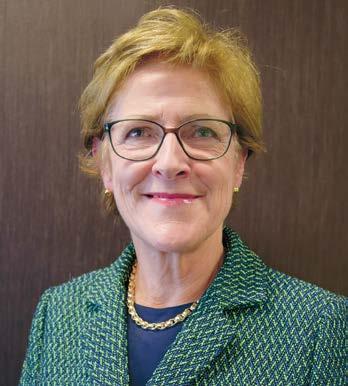
JENNY FIRMAN Chief Health Officer Department of Veterans’ Affairs
If you do suffer from persistent pain, DVA can help you manage it so that you can get back to enjoying the good things in life.
What is pain? Pain occurs when a harmful stimulus is felt (e.g. boiling hot water on your hand) which is then transmitted as a signal through the spinal cord to the brain where it is perceived as pain. Your brain then tells you to pull your hand away. This is a protective response and very normal.
Acute pain occurs with tissue damage of any sort – e.g. a sprained ankle, a broken bone or a surgical incision – and usually tends to resolve over 6 weeks or so. The pain prevents you from doing further harm – it is a protective response.
Chronic or persistent pain is pain that persists after the damaged tissues have healed and is present daily for more than 3–6 months after the initial injury.
Persistent pain is thought to be a result of the normal protective response pathways becoming increasingly sensitised such that activities that previously caused no problem can suddenly trigger the pain response. The brain becomes sensitised in the absence of any ongoing tissue damage. The tissues have healed, but the pain continues and can result in an escalating cycle where you avoid further activity and experience increasing pain, which has a negative effect on your mood and sense of wellbeing.
In other words, the normal protective response does not settle down once the initial injury has
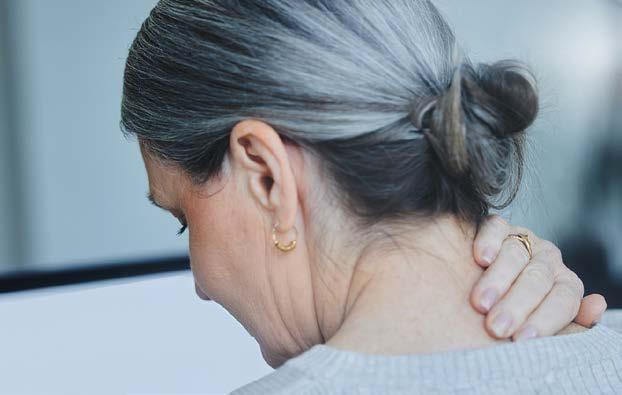
resolved but continues to ramp up. The longer our pain system is heightened, the more protective it becomes.
Why this happens is not known but is thought to be a mix of physical, psychological, social and environmental factors. Persistent pain can be exhausting for both the patient and their family as it becomes all consuming, and the patient loses motivation and can become irritable and frustrated.
Treatment however is available and is focused on retraining the brain and the body to desensitise the abnormal nerve pathways, which results in less pain.
Many patients with persistent pain also have a mental health condition such as depression or anxiety, but the relationship is not straightforward. Unexplained pain is a common feature of a depressive illness and already having had depression or anxiety increases your risk of developing persistent pain. Any co-existing mental health disorder will also need treatment.
A multidisciplinary approach is considered the most effective way of managing persistent pain. This can be managed by your GP or, if more severe, there are specialised pain clinics that can help.
Your treatment plan will include learning about your pain, setting goals to improve your day-today function and increasing your activity levels. Your GP or pain clinic will take a full history to rule out any treatable cause of the pain. They will then develop a plan with you to address improving your function, manage any psychological or social factors, and minimise the use of medications, with the aim of having you resume meaningful and enjoyable activities.
Being active is important as inactivity leads to loss of conditioning and muscle mass, which leads to further stiffness and guarded movements. Physical activity improves strength and flexibility. A physiotherapist or exercise physiologist can develop an individual exercise plan to help you re-learn how to move and how often. This could be based on goals such as being able to walk the dog or walk around the park. The program should be self-paced, with gradual increases in activity over an agreed time frame.
An occupational therapist can help you to identify activities or movements that decrease your pain. They can help you to develop confidence
in undertaking activities and can teach you safe ways of doing things in real life situations.
A psychologist can teach you relaxation techniques or challenge you to think about your pain in a different way. They can help you build new coping skills and address any co-existing mental health conditions.
Social workers may be able to assist with increasing your engagement with the local community.
Pain-relieving medications are useful in the short term, but their role in persistent pain should be reviewed by your treating doctor. Strong pain killers such as opioids can actually cause more harm by making the brain more sensitive to pain and can cause drowsiness. Newer treatments such as medicinal cannabis have only low to moderate quality evidence to support their use in persistent pain. Tapering (gradually reducing) your medication may paradoxically make you feel more alert and reduce your pain.
There are strategies for re-training you brain to enable you to manage your pain.
Living with someone with persistent pain can be very demanding. However, loved ones and carers need to avoid becoming overly protective by taking over all household duties, encouraging the patient to rest and discouraging activity with the aim of preventing their pain from getting worse. Activity, movement and a focus on functional activities are vital. Encouragement and support to keep going is preferred rather than encouraging rest and a reduction in activity.
Other keys to recovery include having adequate sleep (again, the psychologist may be able to help), a good diet, and reducing alcohol and smoking.
DVA will fund persistent pain treatment for all Gold Card holders and White Card holders with an accepted condition relating to the persistent pain. This includes specialist pain clinics, allied health providers and your GP. You may also be eligible for the DVA Veterans’ Home Care Program, which can provide assistance with household services if you are limited by pain.
There are strategies for re-training your brain to enable you to manage your pain. Talking to your GP is a great place to start.

You may have noticed advertising on social media targeted at veterans. These ads could be for competitions or give-aways, offers of free gym memberships, wellness packs or even packaged medications* delivered free to your home. The ads will specify the offers are only available to certain Veteran Card holders.
While the offers may look enticing, if they seem too good to be true, then they probably are.
You may be asked to provide personal information, including your DVA file number, to ‘sign up’. In agreeing to any Terms and Conditions, you could also be authorising the sharing of your personal information with third parties. This
information can then be used to sign you up for medical services without your agreement or knowledge, like for DVA’s Coordinated Veterans’ Care (CVC) program.
Unscrupulous third parties do this so they can claim payments from DVA for services you don’t need or want.
CVC is a valid DVA-funded program that enables a plan to be developed in consultation with your usual GP and care coordinator to manage your ongoing care. It’s important to understand that free incentives from third parties are not part of a CVC Care Plan and should not be the basis for your enrolment in the program.
You can learn more about the CVC Program by visiting the DVA website (search for ‘Coordinated Veterans’ Care’.)
Families, caregivers, friends and other veterans are often the first point of contact for a veteran who is experiencing distress and play an important role in supporting their mental health and wellbeing.
DVA is funding a series of training courses to equip members of the veteran community with increased skills and knowledge to recognise those at risk of suicide, provide support, enact interventions, and enable connection to mental health support.
The programs will cover mental health literacy and suicide intervention and will continue to be delivered across the country online and in-person over the coming 6 months by Mental Health First Aid Australia and LivingWorks Australia.
The Standard Mental Health First Aid course teaches how to provide initial support to someone who may be experiencing a mental health issue or crisis until professional help is received or the crisis resolves.
Suicide intervention training (Conversations About Suicide) provides insights to recognise

when someone may be thinking of suicide, how to reach out, and when to connect them with further support.
To learn more about these fully funded programs and to register, visit:
• Mental Health First Aid Australia: www.mhfa. com.au/mental-health-protect
• LivingWorks Australia: www.livingworks.com. au/who-we-train/defence-veterans
• If a veteran or family member is in immediate danger call triple zero (000)
These are some signs that you’ve been signed up for services without your agreement:
• Frequent unsolicited calls from unknown providers, such as social workers, general practitioners or pharmacists, who don’t clearly identify themselves.
• Your usual GP or other health providers may say they are having trouble claiming payments from DVA.
• You don’t have a direct contact number or practice details of the person(s) calling, and you can’t ring them directly.
• You are not able to easily opt out of receiving calls and services you don’t need or want. If you think this may have happened to you, please contact us on 1800 VETERAN or through the online feedback form on the DVA website
* DVA funds medicines through the Repatriation Pharmaceutical Benefits Scheme. There is a co-payment until you reach the Safety Net threshold. For more information, visit the DVA website (search for ‘Concessional medicines under the RPBS’).


Since 2007, DVA has introduced policies that allow simpler processing of claims for certain medical conditions where exposures in ADF service, a certain type of ADF service or, in some cases, a previously accepted medical condition are known to meet causal factors. This occurs through policies known as ‘streamlining’ or ‘straight through processing’.
Where a veteran has a diagnosed condition and meets the relevant criteria for application of the policies, usually no further evidence is required to establish a connection between the condition and military service.
As part of this work, DVA has recently added ‘dental attrition’ arising from bruxism to the list of conditions subject to streamlining. This means that where a veteran has had bruxism accepted as service-related, a claim for dental attrition will be subject to faster processing. Bruxism is a medical condition that involves excessive tooth grinding or jaw clenching. It can give rise to a separate condition – dental attrition – which involves damage from toothto-tooth contact.
There are now more than 80 medical conditions subject to these policies, and this change will allow for quicker access to compensation and treatment for dental attrition for eligible veterans who have bruxism caused by service.
There is a lot written about post-traumatic stress disorder (PTSD), and it is important to be able to distinguish the hype from the evidence. PTSD is one of the most common mental health conditions in military populations.
Research focused on ADF personnel indicates that the estimated rate of PTSD among current serving members is 8%, rising to 17.7% among ex-serving; the rate in the Australian population is estimated at 5.7%.
Despite what you may hear and read, we know a lot about what works and what doesn’t, and also what complicates treatment outcomes. What we need to get better at is knowing what works for whom, when and under what circumstances. This is especially the case given that in the military and veteran population, there is more likelihood of co-occurring mental and physical health conditions.
Military-related trauma is often associated with problematic anger, substance misuse, sleep disturbance, depression, guilt and shame, as well as chronic pain and other physical health conditions. This can lead to a reduced response to treatment for this population. Stigma also plays a part in reluctance to get treatment.
PTSD symptoms may start years after the incident, or they may come and go over time. They can be exacerbated by life events and time of life. The symptoms most common to PTSD are:
• reliving the event/s, sometimes in the form of flashbacks
• avoiding anything that reminds a person of the event/s
• having more negative thoughts and feelings than before the event/s, including anger, fear, shame and guilt
• feeling on edge or keyed up.
These symptoms are common after a traumatic incident but they usually start to resolve within a few weeks. If symptoms don’t resolve themselves, and are leading to problems in your life, such as problematic anger and interpersonal difficulties, and you’re becoming emotionally numb and socially isolated, then you may meet criteria for a PTSD diagnosis.
PTSD can be debilitating and can impact a person’s ability to function as a parent and/or partner. It can lead to stress within the family and its needs not being met. In fact, one of the most common reasons that people seek help can be the strain these symptoms put on their relationship.
PTSD is a condition that can be treated. Effective treatments for PTSD are available, including the use of adjunctive treatments such as exercise, yoga and assistance dogs. Australia has developed guidelines, to help guide clinicians, veterans, children and adults. You can find these
on the Phoenix Australia website ( phoenixaustralia.org).
Treatments include therapy, medication, or a combination of the two. Recommended counselling approaches for adults that target the traumatic memories include trauma-focused cognitive behavioural therapy, cognitive processing therapy, trauma-focused cognitive therapy, prolonged exposure, and eye movement desensitisation and reprocessing.
Enhancements to interventions are also being studied and include psychedelic-assisted psychotherapy and brief and intensive trauma-informed therapies. DVA continues to monitor the research and has developed a webpage to provide information to veterans and their families (Look for ‘Emerging and Adjunct Treatments for Common Mental Health Conditions Affecting Veterans: A Rapid Evidence Assessment’ on the DVA website.) It is important to note that emerging treatments should be tried only after evidence-based treatments have been found to be ineffective.
What we know about treatment is that it is not one-size-fits-all, that it takes time, it takes trust, and it requires using a range of interventions that we know work. As a clinician, it is often a difficult juggling act to know where to start as there are often a range of difficulties present, all vying for attention and intervention.
As avoidance is a hallmark of PTSD, and if you use unhelpfully avoidant coping strategies as your go-to, then it is likely that treatment may be delayed for years. A way of dealing with distressing symptoms is to try and drink them away, or use other mind-altering substances. This, of course, just makes the problem worse.
What we know about treatment is that it is not one-size-fits-all, that it takes time, it takes trust, and it requires using a range of interventions that we know work.
Anger is another area to be addressed. It is often a way for people to avoid engaging with people and dealing with difficult memories and situations. Problem anger is strongly associated with PTSD and other mental health conditions, such
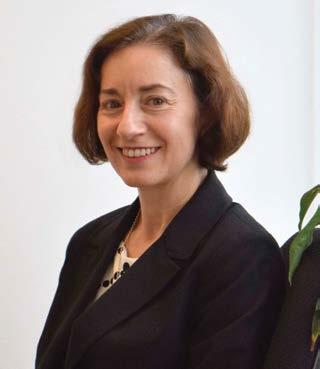
DR LORETTA POERIO
Senior Mental Health Adviser
Department of Veterans’ Affairs
as alcohol abuse, in veteran and military populations. It is increasingly seen as an important consideration in trauma-impacted populations, and as a mental health issue in its own right. Adding to this complexity is the fact that veterans experiencing poor physical health and chronic pain are often also likely to have heightened levels of distress, anger and irritability, which diminishes their capacity to manage their emotions. Add other mental health symptoms such as depression and alcohol and other drugs, as well as sleep difficulties, and the complexities become apparent. DVA is working to better support providers treating veterans with complexities, through support for case coordination and comprehension care of medical and psychiatric issues through the CVC program, and funding of rehabilitation programs.
Another factor is that therapy is a two-waystreet. Treatment requires that you are an active participant and that you trust your clinician enough to engage with the therapeutic process. There are treatments that work that can make a significant difference to a person’s quality of life. Often, because there are many areas of intervention, a range of treatments will need to be used in parallel or consecutively, and treatment may take some time. Clinicians at Open Arms – Veterans & Families Counselling are well trained in dealing with military trauma and are a great place to start (openarms.gov.au).
Treatment can comprise a series of stages, with different interventions at varying ‘doses’ or intensities, depending on the need of the individual veteran. This may include couple and/or family therapy. It may be the case that you are not ready to work on your trauma memories, but that does not mean that you can’t focus on other areas that are creating difficulty, such as sleep, anger or relationship difficulties. It also does not mean you will never be ready.
As a final note, this is my last article for Vetaffairs as I will be leaving the Department at the end of the year. I thank you for your feedback and kind wishes over the 7 years of writing the mental health column.
When navy veteran and LGBTIQ+ advocate Rachael Cosgrove-White was medically separated from the Navy, she admits that her mental and physical health suffered.
‘To be a professional mariner for
you had to say farewell to the high seas, I struggled,’ Rachel explained. ‘It took about 8 months before I could even talk about what could be next without coming to tears.’
These days, Rachael has both feet
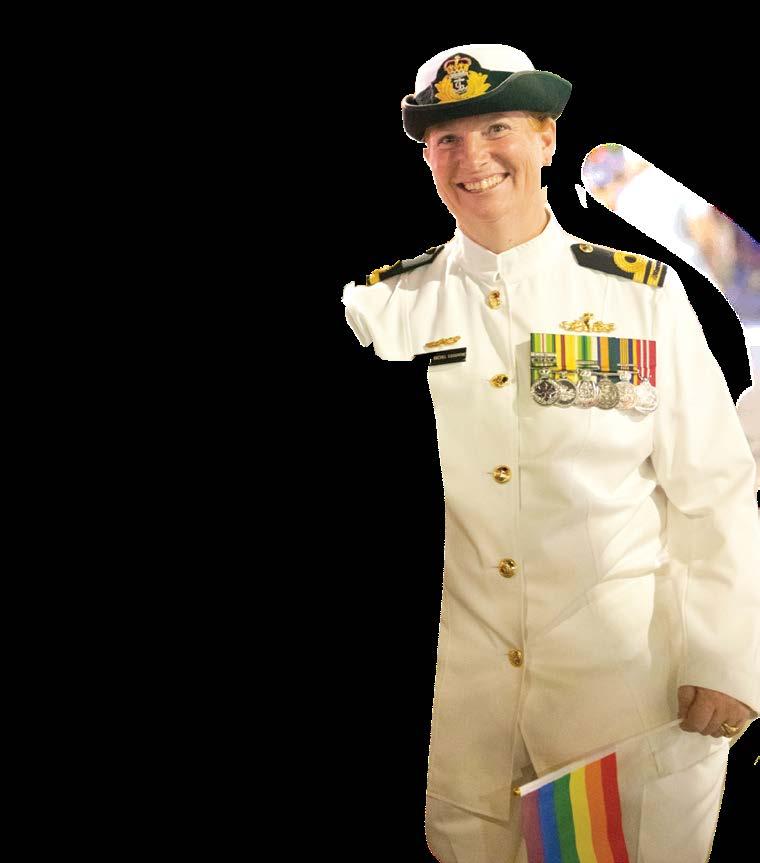
committed to helping other veterans and current ADF personnel, including those from the LGBTIQ+ community and their families, to overcome life’s challenges.
She actively encourages them to seek free military-aware mental health support from Open Arms.
‘Statistically, we know that LGBTIQ+ people are exposed to a higher risk of suffering depression, anxiety and suicidality then the rest of the population,’ Rachael said.
Now a Veteran Engagement Adviser with the Repatriation Commission and President of the Defence LGBTI Information Service, Rachael understands from her days in the service why her community may be reluctant to seek help.
‘I went back “in the closet” when I first joined for my own protection, but then I asked myself how I could build strong relationships if people around me didn’t know the real, authentic me,’ she said. ‘As an
out gay woman it was hard, I was unsure who I could trust and even if I was going to find my people.’
With many years of lived experience behind her, Rachael hopes more veterans and current serving members from the LGBTIQ+ community will take that first step and reach out to Open Arms for support.
‘An LGBTIQ+ person must disclose so many details before they even get to the “why am I here?” question,’ she said. ‘This can be very daunting for people, even when they know they need help. We need all of our gender diverse families, individuals and those yet to know who they are to see that they can and do fit in everywhere.’
It doesn’t matter who you are, Open Arms offers free military-aware mental health support to anyone who’s served 1 day in the ADF, along with their immediate families.
Navigating a career in the Navy as a transgender man has not been smooth sailing for Ben, or his mental health.
‘It has been a path paved with a lot of gravel along the way,’ Ben said. ‘In the beginning, I experienced a lot of stress, anxiety and trauma and felt very isolated.’
Ben initially joined the Navy as a woman and decided to transition with the support of a psychologist.
‘Back then, it was not an easy process,’ he said. ‘I didn’t know anyone in the LGBTIQ+ community and felt segregated in many ways from the Navy community. After my surgery,
A new Open Arms office has opened on the Gold Coast to support the region’s booming veteran population, which now ranks as one of the nation’s top 5 local government areas for former ADF personnel.
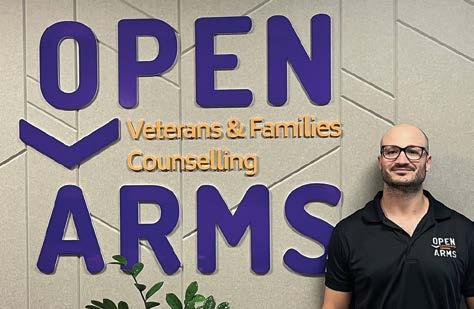
I stayed ashore for many years and my career progression was held up because of this.’
During some of his most challenging times, Ben sought help from Open Arms, where he felt 100 percent supported:
‘In the beginning I was carrying a lot of trauma and felt like no-one cared. I had also experienced a lot of bullying, so it was good to have someone listen to what I had been through and offer understanding and support. Even though they hadn’t lived my experience, I knew they cared about helping me to feel less stressed and anxious and to embrace who I am.’
The spacious facility located in Bundall offers face-to-face counselling, group treatment programs and practical support from Lived Experienced Peers who walk beside their clients during their support journey.
One such peer is Army veteran Sean Skelton, who says the new centre has been designed to assist more veterans.
‘We have a bigger space to accommodate more counsellors and more case managers,’ Sean explains. ‘Lifestyle is a big factor for our large veteran population on the Gold Coast – and you can see why. It is very relaxed here and people love the sunshine and being close to the beach.
‘Many of our veterans served at Canungra’s Kokoda Barracks and there are also those who served at the Enoggera Barracks in Brisbane and decided to relocate to the coast with their families.’
Sean says another advantage of the new Open Arms office is its shared space with the RSL’s Gold Coast District Office.
‘It is fantastic because we can help more veterans through greater collaboration,’ he says.
‘Open Arms is already working with the RSL’s welfare team to ensure we find the right solution for veterans who are approaching one or both organisations in the same building. This way we can ensure that veterans and their families receive the support and help they need.’
Sean says this support includes helping veterans to stay connected to their mates.
‘I see people who isolate themselves and that is not good for anyone’s mental health and physical wellbeing. As Lived Experience Peers, we also support veterans to find their purpose through education and employment opportunities, and build strong connections with family and friends.’
The former Open Arms office at Broadbeach is no longer in operation. The new office is located at 128 Bundall Road, Bundall, and can be contacted on 1800 011 046.
Hobart Lived Experience Peer and Army veteran Kyle Moyle has seen first-hand how Tasmania’s Group Program offerings have changed lives for the better.
Since it began earlier this year, he and his fellow Open Arms peers have helped to support 22 veterans to successfully complete 3 separate 8-week programs in Hobart, Burnie and Launceston.
Kyle says the Peers and clinicians who were involved in delivering the 3 programs were all proud of the veterans and the impressive progress they had made. ‘Every one of them came for the 8 weeks and stayed for 2 hours each week,’ he says. ‘No-one dropped out – which is absolutely amazing.’
Kyle, who has had his own struggles with mental health, says it was great to see the veterans now implementing positive changes in their lives: ‘For example, veterans who have enrolled in the program, some of whom had been discharged for a number of years, are having some
amazing personal breakthroughs. It gave me goosebumps to hear how they came to this self-realisation as they reflect on their journey and the impact service has had on their identity.’
The veteran-specific programs are focused on helping local veterans reflect on how they react to stress and develop practical skills to reduce the impact of stressful situations.
The programs have been developed with intensive Peer involvement, with military-aware and trauma-informed principles underpinning the programs.
Stress can lead to distress, which is a longerterm change, and which can be serious enough to result in the development of disorders including anxiety, depression and PTSD.’ These programs can help veterans to better understand service culture, to recognise stress and potential emotional triggers, and learn how to develop coping mechanisms and stress management techniques.
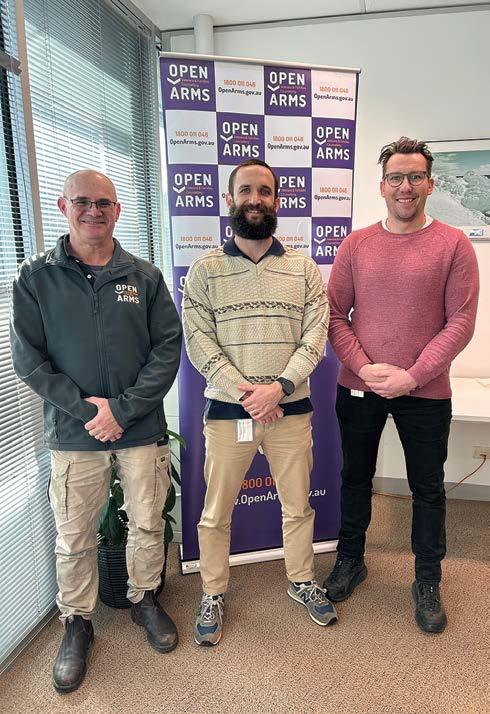
When current serving ADF personnel, veterans and their families reach out to Open Arms for support, their recovery journey is guided by a Model of Care which delivers specialised military-aware and trauma-informed services.
This care may include counselling, Lived Experience peer support, or group treatment workshops and programs which are delivered as Episodes of Care.
Head of Open Arms Leonie Nowland explains that these Episodes of Care are provided in the same way as other health services. ‘Having our own Model of Care means we can be clearer about what we do and how we do it with the veteran, including their families,’ Leonie says.
‘It begins with understanding needs and setting agreed goals, and ends with measuring outcomes from the perspective of our client.’
Leonie says the services provided by Open Arms were evidence-based with a beginning, a middle and end to help support a full recovery.
‘If you keep people as a patient or a client, that is not consistent with a recovery focus and can indeed exacerbate the individual’s feelings of helplessness and distress,’ she explains. ‘However, if people do need to
receive further support, we continue to assist, and try to make it as easy as possible for them to access it.
‘Under our Model of Care, extended care is also goal-based and outcome-focused.’
To find out more a about the Model of Care and Episodes of Care, visit the Open Arms website. (Search for ‘What to expect – Frequently Asked Questions’.)
Kate models her own care
Lived Experience Peer Kate unknowingly modelled her own recovery on the Open Arms’ Model of Care, which she now uses to help others get their lives back on track.
‘After 20 years as an Army spouse, I reached out to a psychologist for what was my first Episode of Care,’ Kate said. ‘Even though I was used to my husband being away for prolonged periods, at times I struggled to cope with undiagnosed clinical anxiety, depression and obsessive-compulsive disorder.’
Her psychologist initially advised to go back to her doctor, who prescribed medication. ‘I didn’t want to take it but I was so unwell,’ Kate recalls. ‘I wasn’t ready to do the work that I needed to do long-term.’
After 6 months, Kate returned to her psychologist to learn strategies and set goals, which she now understands was a further Episode of Care. ‘At the end of my sessions with her, I had built my own tool belt to help regulate my feelings and to keep moving forward.’
Kate now practices regular self-care, which includes seeking additional mental health support when she needs it. ‘After losing a parent, I had a lot of unresolved grief so I linked myself back into clinical support, which was another Episode of Care for me.’
As an Open Arms Peer, Kate encourages and supports current ADF personnel, veterans and their families to achieve the best possible outcomes from utilising services offered under the Model of Care.
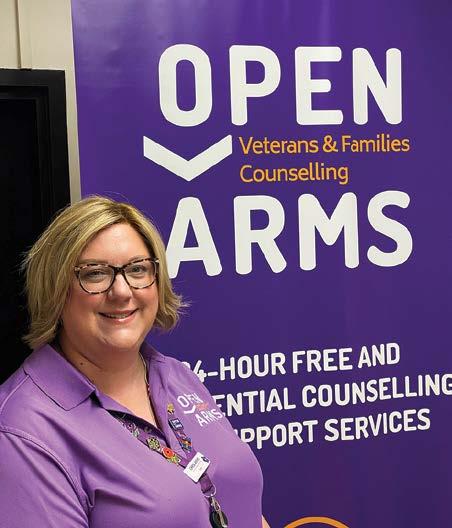

For this kind, you need to get your hands dirty.
Will Gold served as a mechanic in the RAAF for 6 years, working on Hawk aircraft, before shifting gear to become a dietician. While it might seem a radical change, Will had always enjoyed the military’s focus on fitness and a healthy lifestyle, so it seemed like a natural transition.
But as Will began his new career as an Accredited Practising Dietitian, he gradually came to notice that people with poor diets often had poor mental health. While good diet and good mental health might seem like different aspects of our wellbeing, it is remarkable how closely interconnected and interdependent they can be.
‘The other thing that struck me, was that while there were many programs to improve veterans’ mental health or physical rehabilitation, diet was often forgotten,’ says Will. ‘And this is despite its ability to improve both physical and mental wellbeing.’
It was on this premise that Will founded Dig in Health Co in 2021, to help improve veteran wellbeing through making good dietary choices. But Will had bigger aspirations for Dig in Health. He saw the potential not only to improve wellbeing through diet, but through horticulture too.
Of course, it has long been known that horticulture can have a positive impact on wellbeing. Leigh


McGaghey, President of Therapeutic Horticulture Australia (THA), notes that ‘in the wake of the First World War many repatriation hospitals introduced some form of community garden or horticultural program to help alleviate the impacts of shell shock for returned veterans.’
From paddock to plate
In the intervening decades, those programs became more about physical rehabilitation, but their therapeutic benefits are being rediscovered. This is what Will wanted to tap into when he developed the Paddock to Plate program.
‘It’s a 4-day workshop to teach people the basics of how to establish and grow a garden, and think about diet in a more holistic way,’ says Will. This goes to everything from thinking about the lay of the land,
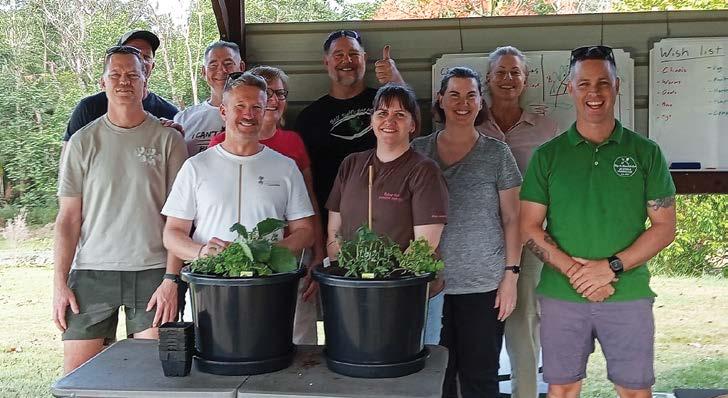
and the way sunshine and shadows fall, to how rain drains, what seedlings to select, how to build healthy soil and create a productive garden bed.’
Will explains that the program deliberately cuts across numerous wellbeing aspects: ‘It gets people into nature, working with their hands to make something and help it grow. And it gets them thinking in a more meaningful way about where their food comes from.’
The Paddock to Plate program helps improve dietary choices by empowering people to choose for themselves. ‘We were all told to eat our veggies when we were kids,’ says Will. ‘We know fresh produce is what’s best for us, but just telling someone what to do rarely changes behaviour. Once they know how to grow the food, and when they’re given agency, we see their diet improve.’
Beyond improved diet, Will has noticed another benefit: many of the program’s participants have reported a newfound purpose and sense of pride. ‘I believe there is an innate human desire to provide for our families and loved ones, and food is so fundamental to that,’ says Will.
Some veterans have physical injuries from their service that have kept them from the workforce. Building a garden, growing produce and putting food on the plate can give them back the role of provider. ‘There are few things more fulfilling than

President of Therapeutic Horticulture Australia Leigh McGaghey
sitting down to share a meal with your loved ones knowing some of what’s on the plate came from your own labour,’ says Will.
A smorgasbord of benefits
THA President Leigh McGaghey agrees the range of benefits horticulture offers is vast. ‘And one of the great things about learning these skills is they are scalable to whatever your situation is,’ she says. ‘The basic principles of gardening can be applied to everything from a window sill to a botanical garden.’
Horticulture also offers the chance to connect with people in a shared activity. ‘Social engagement and having a shared activity can give people a real sense of purpose and can bring new meaning to their day,’ says Leigh.
Aged care facilities have long used community gardens to foster social connection, but Leigh says any community can enjoy the same benefits: ‘I’ve seen veterans who have worked with their local RSL to establish a garden, providing both a sense of community and a shared project to work on.’
This represents another area where horticulture can improve wellbeing – by building meaning into our day. Many of Will’s participants in the Paddock to Plate program found it
through growing produce, but the same is true when it comes to other professions. Leigh says the benefits of therapeutic horticulture can be applied to a range of occupations, including landscaping, plant propagation and grounds-keeping.
That is certainly the case for Brendan McDonald. Brendan served in the Australian Army for 18 years and undertook two tours of Afghanistan before joining DVA’s Office of Australian War Graves where he is now a Trade Services Coordinator.
At rest in nature’s beauty
The team Brendan works with is responsible for maintaining some 70,000 official war graves across 380 cemeteries spread between Rockhampton and Longreach in Queensland and Glenn Innes in northern New South Wales. The work involves everything from maintaining and installing plaques and irrigating the lawns, to selecting plants that will not only look beautiful, but thrive in the conditions where they’re planted.
‘For us, every day is Anzac Day,’ says Brendan. ‘It’s about ensuring the grounds look as good as they can, so when families or friends visit they can see their loved one is cared for.’
For Brendan, the families’ reactions when they see how their loved ones are memorialised makes the effort all worthwhile: ‘These are more than just names in picturesque parks. Mates I served with are commemorated at these sites; this is the place where their memory is preserved and their service honoured, so being part of maintaining that connection has special meaning for me.’
And while Brendan never sought out this career path for its wellbeing benefits, it has nevertheless made a big difference in his life. ‘This is the best job I’ve ever had, and I won’t be leaving until it’s my turn to go up on the wall’ he says, and adds that there aren’t a lot of veterans currently working in the space, but he’d encourage others to consider it: ‘My being here really hits home for others about how important this work is, and the impact it has for the veterans and their families, so it would be great to see more veterans join us.’
Leigh McGaghey finds stories like those of Brendan and Will so encouraging. ‘The benefits of horticulture
and gardening are only just starting to find an audience in the veteran community,’ she says.
‘It’s staggering just how many aspects of life horti culture can intersect with and improve. I’ve seen specific therapies designed to help physical rehabilitation and mental health, and I’ve seen communities come together to build a garden and create social connections around a shared activity. And then there are people like Will who are fostering healthy lifestyle and diet around horticulture, and others like Brendan who find a sense of purpose and pride in their work.’
This is the power of horticulture: it can mean different things to differ ent people. Leigh believes horticulture as a restor ative treatment is well on its way to finding a larger audience: ‘THA is in talks with DVA to see where we could partner on projects and help improve vet eran wellbeing.’
Of course, it is important to remember that anyone can benefit from horticulture simply by being outside and in the garden because, as Will says, ‘nothing beats being in a green space.’
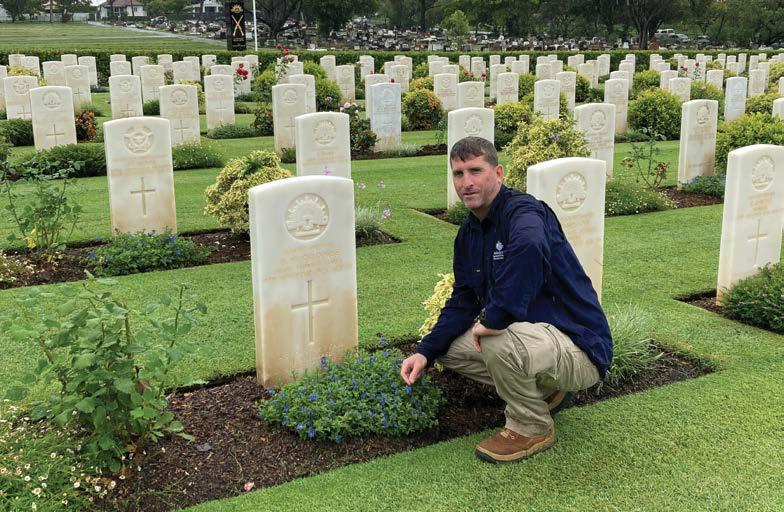
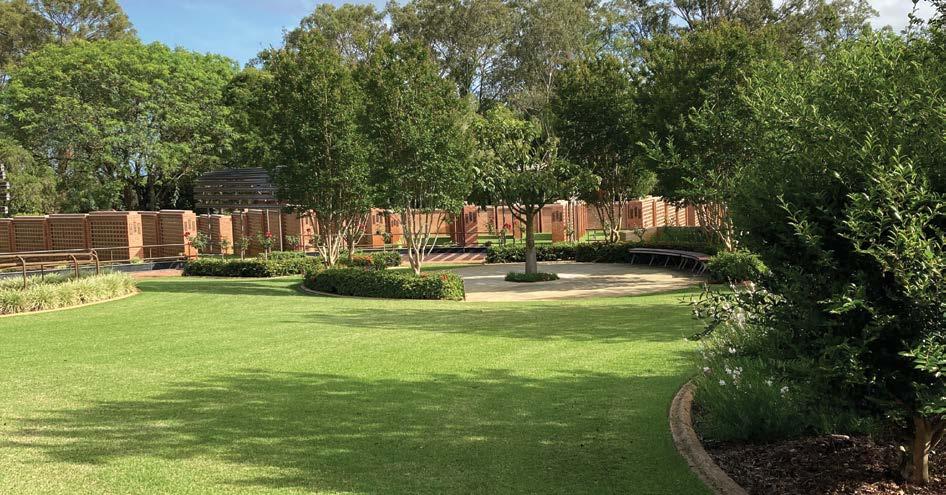
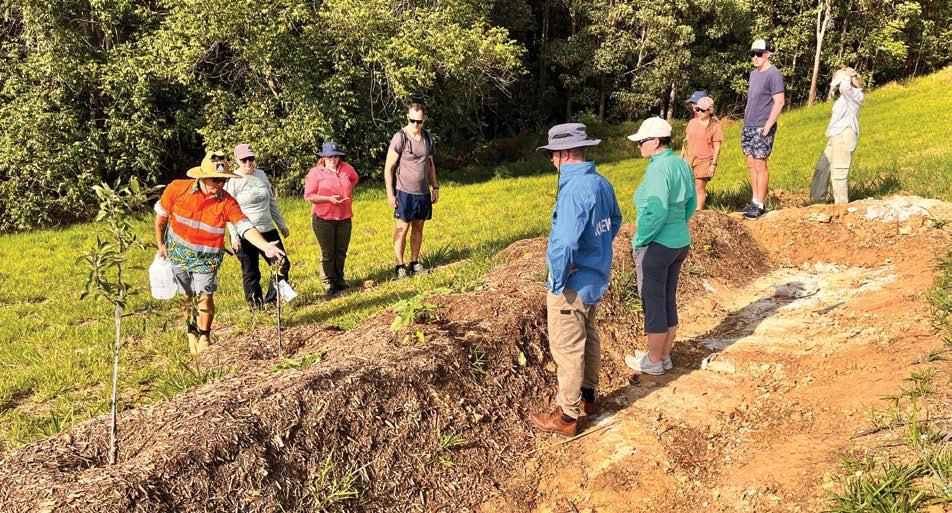
THA provides a range of resources and educational material on its website about the therapeutic benefits of horticulture and how it can be adapted to fit anyone’s situation. See https://tha.org.au.
If you are interested in the work of Dig In Health Co or joining the Paddock to Plate workshops delivered in partnership with RSL Queensland, visit www.diginhealthco.com.au.
To find out more about the work of DVA’s Office of Austral ian War Graves, visit www.dva.gov.au/wargraves.
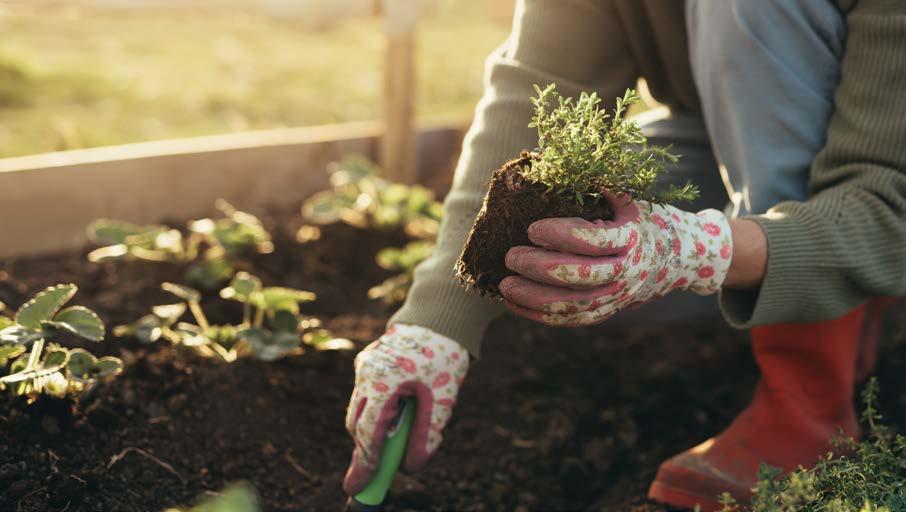
The Prime Minister’s National Veteran Employment Awards celebrate the remarkable contributions of veterans and veteran partners in the civilian workforce and the organisations that support their employment. The winners of the 2024 awards were announced at gala ceremony held in Canberra on 26 November.
The event highlighted the exceptional skills veterans bring to the workforce, while recognising organisations dedicated to creating opportunities for those who have served in the ADF.
This year, the Outstanding Employer of the Year award was presented to Veteran Mentors, which was acknowledged for its exceptional work in supporting veterans and empowering young Australians through its transformative programs for youth. With a high proportion of veteran employees, Veteran Mentors ensure that veterans are well-prepared for mentoring roles by providing scenario-based training and prioritising ongoing career development.
Presenting the award, Prime Minister Anthony Albanese spoke
VETERAN EMPLOYEE OF THE YEAR
Callan Gardner, Site Manager, NSW Distribution Centre, Stryker Australia

Eden Santos
Engagement Manager, Ironside Resources
Eden’s experience as a Defence partner offers deep insight into ADF life. At Ironside Resources, she excels in guiding veterans through their move to civilian careers, educating employers on the benefits of hiring veterans and aligning military skills with civilian roles. Eden’s personalised approach and dedication significantly impacts the lives of veterans and veteran families, strengthens the community and promotes local economic growth.
Callan is the Site Manager at Stryker, one of the world’s leading medical technology companies, where he has excelled since joining in 2011. A former Australian Army Rifleman with the 2nd Battalion, Royal Australian Regiment, Callan served in Afghanistan in 2011. His leadership, logistical expertise and dedication to veterans have made a lasting impact at Stryker and within the broader veteran community. As a foundational member of the Stryker Australia’s South Pacific Veterans Association, he passionately advocates for their issues, working tirelessly to support his peers and their families.

about the importance of harnessing veteran talent.
‘These Awards serve as a powerful reminder of the remarkable contributions veterans make to the community each and every day,’ the Prime Minister said. ‘It’s an honour to recognise the incredible efforts of these individuals and organisations in the veteran employment space. Congratulations to all the winners.’
In addition to celebrating the achievements of organisations, the awards also honoured veterans and veteran partners who have excelled in their post service careers,

PARTNER ENTREPRENEUR OF THE YEAR
Dr Annabel McGuire Co-founder and Director, GripFast Consulting
Dr Annabel McGuire, co-founder and Director of Advisory Services at GripFast Consulting, leads with a profound commitment to veterans. Since 2014, the firm has excelled in project management and advisory services while actively recruiting veterans and providing pro-bono support. As Legacy Brisbane’s first female president, Annabel is renowned for her strategic impact and dedication to the veteran community.
continuing to make significant contributions in civilian life.
Minister for Veterans’ Affairs Matt Keogh reflected on the importance of supporting veterans in their post-service careers saying that the Royal Commission made it clear that there is more to do to improve transition for veterans.
‘We’re taking that seriously and the Veteran Employment Program plays a significant part in that,’ Minister Keogh said. ‘These awards demonstrate just how much the veteran community has to offer after their Australian Defence Force service.’
VETERAN ENTREPRENEUR OF THE YEAR
Nadia Teong Founder, Veterans Psychology
Nadia, founder of Veterans Psychology, combines her 11 years in the ADF with expertise in veteran mental health. Leading a team of 13 psychologists, 11 of whom are current or former ADF members or veteran family members, Nadia provides exceptional veteran-focused services. Her work addresses key challenges in mental health care, enhancing support for veterans and their families across Australia.
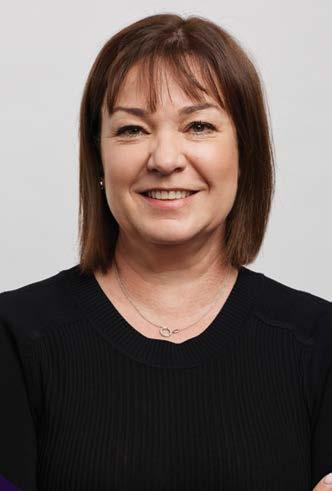
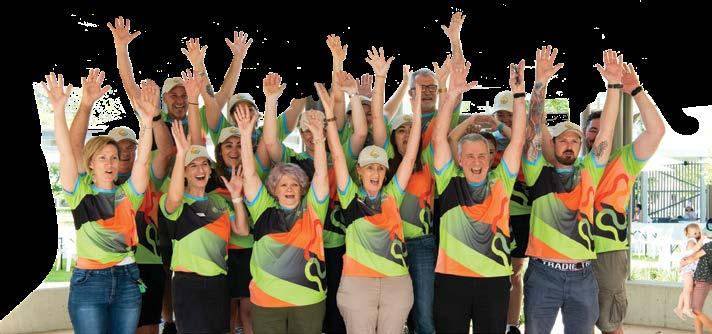
EXCELLENCE IN SUPPORTING VETERAN AND/OR PARTNER EMPLOYMENT – REGIONAL
OF THE
The Oasis Townsville stands as a vital cornerstone for the veteran community in Townsville, serving as a dynamic hub for both current and former ADF members, their families, and local ex-service organisations. The community centre offers a welcoming and fully accessible environment, where veterans and civilians can come together to engage in activities that foster connection and integration.

Serco Australia excels in program management services, supporting defence forces across Australia, New Zealand and Hong Kong, with more than 16,000 employees. With 4.8 percent of its Australian workforce being veterans, Serco champions veteran employment through its SercoVets Care2Connect program, tailored recruitment and leadership development opportunities. Serco’s commitment to continuous improvement in veteran support sets a high standard in the industry.
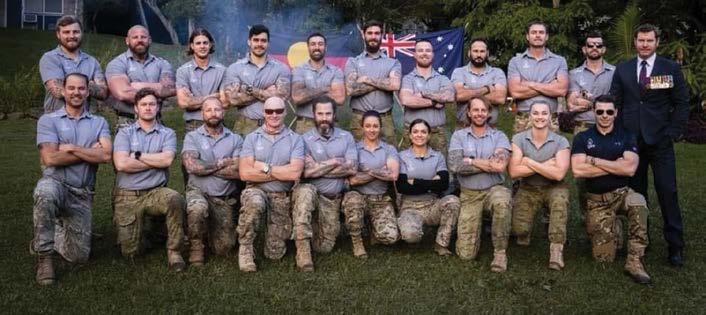
EMPLOYER OF THE YEAR – MEDIUM
Veteran Mentors empowers Australian youth by teaching effective life skills through transformative veteran-led programs. Its tailored training approach ensures veteran mentors are well prepared and continually develop their workplace skills. Veteran Mentors’ innovative policies and dedication to meaningful training highlight its significant contribution to both the youth it serves and the veterans it employs. Veteran Mentors’ focus on fostering resilience and personal growth in youth, alongside creating a supporting environment for veterans, highlights its impact on both communities.
AeroPM delivers specialist services to support Defence in acquiring complex assets through a predominantly veteran workforce. The organisation is dedicated to harnessing the skills of former ADF personnel, with 81 percent of its workforce comprising veterans. Its proud advocacy and innovative employment practises has not only showcased the exceptional abilities of veterans, but has also demonstrated how these qualities can be harnessed to enhance Defence capabilities.
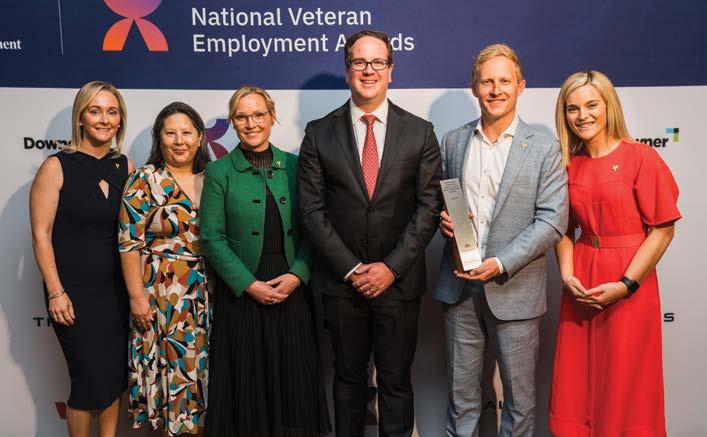
Geoff Evans, is a true example of continuing to serve. After his ADF service, Geoff founded Disaster Relief Australia, bringing together veterans, first responders, and volunteers for disaster recovery. Geoff’s focus on mental health, skills development and meaningful engagement through volunteering has created valuable pathways for the veteran community.

For more on this year's winners, finalists, and their inspiring stories, visit www.veteransemployment.gov.au/ awards/2024-finalists
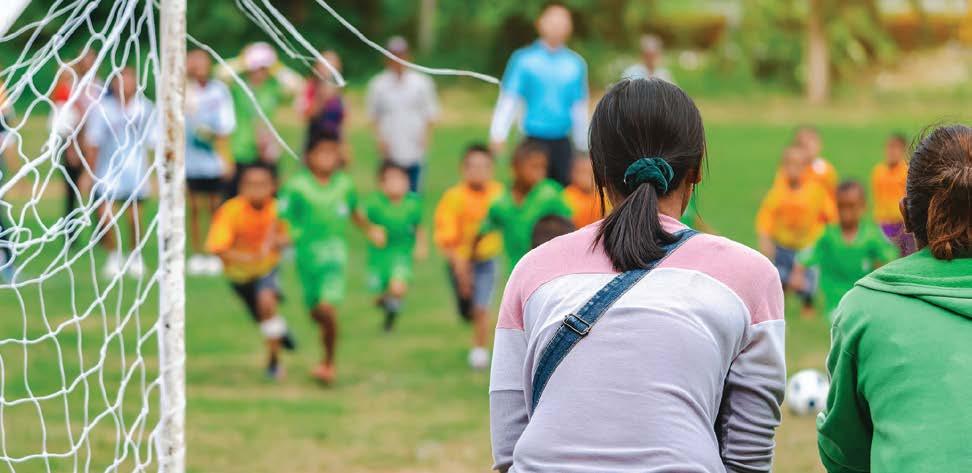
The Defence, Veterans’ and Families’ Acute Support Package provides shortterm, flexible support to help eligible veterans and veteran families adjust to new and challenging life circumstances that may result in the family experiencing crisis.
New and challenging life circumstances are situations or events over which a person has no control, which have occurred recently, and are impacting on the veteran or veteran family’s wellbeing, or their ability to function. The impact of a new and challenging life circumstance is unique to each family.
The types of life circumstances which may result in the family experiencing crisis can include mental and physical heath episodes, including substance abuse issues, incidents of self-harm and attempted suicide. They may also involve family issues such as conflicts, breakdowns and violence; or sudden, significant events such as a death in the family.
There are specific eligibility criteria for the


veteran’s eligibility for certain payments, and relationships. For bereaved families, eligibility includes whether the veteran’s death was related to military service and occurred less than 2 years ago. Where a family may not be eligible, DVA can help connect them with other programs and government or community services and supports.
Under the Acute Support Package, a family will have a support plan developed with appropriate and beneficial services to meet their needs.
These are services that may:
• help around the home, such as cleaning and meal preparation, to help a family maintain day-to-day activities during times of increased stress
services (including tutoring, music lessons and sporting activities), which may help a family cope at a time when they may be experiencing challenging events
• help reduce barriers to participating in the community, such as short courses and group activities
• support broader, positive lifestyle changes, such as counselling which addresses problematic behaviours, and psychosocial services to build resilience and confidence or provide social connectedness.
The DVA website has recently been refreshed to provide clearer information on who may be eligible, how to access the program, and the types of supports that may be funded under the Acute Support Package. If you would like more information about the package please visit www.dva. gov.au/asp, or call us on 1800 VETERAN (1800 838 372), from 8 am to 5 pm, Monday to Friday, and say ‘Acute Support Package’ when prompted.
The Acute Support Package is not a primary response service in emergency situations. If you or someone you know is in immediate danger call triple zero (000). To seek support from Open Arms – Veterans & Families Counselling, call 1800 011 046.




Find out how a veteran could be your next best hire.
COMMISSIONER GWEN CHERNE
For more than a century, the Repatriation Commissioner has focused on supporting veterans – those who risk their lives for our freedom. But one essential aspect was overlooked: a voice for families, the silent strength beside our veterans.
Since my appointment as the inaugural Veteran Family Advocate Commissioner 4 years ago, I’ve worked to place families, who share in veterans’ struggles, at the centre of our support system. The resilience of these families has inspired me every day.
This role is about more than policy; it’s about making sure families are not left to face life’s toughest moments alone. From the start, my mission has been clear: to amplify families’ voices and ensure their sacrifices are acknowledged. Though they stand quietly when medals are pinned, their contributions are as integral as the service itself. My goal is to ensure that no family stands alone – whether they are adjusting to life after service or grieving the loss of a loved one.
The Royal Commission into Defence and Veteran Suicide has highlighted the heavy challenges families face, especially regarding mental health and the tragedy of suicide. Families experience every
deployment and struggle alongside their loved ones. The Royal Commission’s Final Report reinforces what I’ve always known: supporting veterans must mean supporting families. When veterans suffer, families suffer too.
I have seen firsthand how profound the impact of suicide is on families, often leaving them to navigate complex, fragmented systems with little guidance. In moments like these – when a mother is trying to understand her son’s service history after a tragic loss – it becomes painfully clear that we need a support system that is transparent, compassionate, and trauma-informed. No family should ever feel isolated, lost, or abandoned by the systems meant to support them.
One of the Royal Commission’s most urgent findings is the need for postvention support – the care provided to families after a loved one’s suicide. Suicide’s impact ripples beyond immediate family, affecting entire communities. Families need
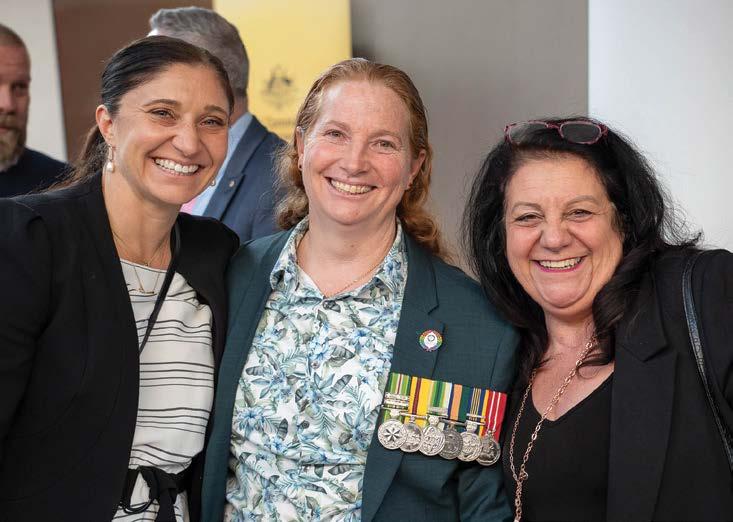

more than resources; they need understanding and continuous care. This emphasis on postvention aligns with my advocacy for a compassionate framework to help families heal and thrive.
The Royal Commission’s report also identifies barriers families face in accessing support. Information is often inconsistent, and the claims process can be overwhelming, particularly for those already dealing with trauma, mental health struggles, or the aftermath of a suicide. Simplifying these processes is essential – not just for veterans but for families who rely on these entitlements for stability. These are not just administrative changes; they are life-changing reforms that can ease the burden on families.
Better data and research are also crucial to understanding the unique needs of veteran families.
Chapter 29 of the report calls for the use of comprehensive datasets, such as the Person Level Integrated Data Asset, the Household, Income and Labour Dynamics in Australia Survey, and Australian Bureau of Statistics data, to provide a clearer picture of who these families are and how best to support them. This insight will help tailor policies that address the needs of veterans and families at every stage.
As we recognise these sacrifices, I believe it’s time for national acknowledgment. War Widows Day, currently recognised in some states and territories, should be a National Day to honour those who have lost a spouse in service. War widows and widowers bear an irreplaceable loss, and their grief and resilience deserve national recognition.
However, it does not encompass the grief carried by parents, siblings, and others who have lost a child, brother, or sister. This is why I am advocating for a National Defence and Veteran Family Day

– an inclusive day to honour all family members who support veterans through every challenge and who, in some cases, endure the deep pain of loss. These families are the backbone of our military community, deserving of both our gratitude and practical support.
We have seen some progress in education and employment support for Defence families. Advocating for a Defence and Veteran Family Identifier on school enrolment forms will ensure that veterans’ children receive support during critical educational moments. These children often carry unseen burdens, and by recognising their needs, we help them thrive despite challenges at home.
Employment programs, such as the pathways pilot for Defence and veteran partners in Townsville, are also giving families opportunities to build stable careers. These initiatives go beyond job placement; they aim to restore dignity and economic stability to families frequently uprooted from the workforce.
The Royal Commission’s findings provide a foundation for understanding the challenges faced by veteran families. However, while these findings shed light on critical issues, implementing and funding the recommendations requires ongoing advocacy and commitment. The Government’s response is the starting line and provides valuable guidance for the path forward in supporting families.
Reflecting on my time as Commissioner, I feel pride and a strong sense of urgency. We have made progress, but there is still much more to do. Together, we can ensure every veteran and family feels supported, recognised, and valued – not just with words, but through lasting action. And together, we can build a future where no family faces these challenges alone.
A message from Defence Families of Australia
The new lead advocate for families of current ADF members sees an opportunity for organisations serving the cohort to work better together to uncover crucial information from families during transition from service.
Defence Family Advocate of Australia, Charlotte Webb, said transitioning out of Defence offered not just the member, but their families, the chance to reflect on the challenges faced, as well as changes they saw along the way.
‘If we can encourage families to better engage with Transition Coaches and Defence Member and Family Support during this time, Defence Families of Australia (DFA) can leverage this information from those branches to advocate for Defence to improve the experience for other current serving families,’ Ms Webb said.
DFA can advocate for families for up to 2 years following the transition from full-time service while Defence’s transition policy still applies to them.
‘Some families have decades of experience navigating the challenges of Defence family life, and everyone’s experience is different. By tapping into this wealth of lived experiences and sharing information with Defence, together we have an opportunity to make real, meaningful change for generations of serving families.’
Ms Webb was recently appointed to the role of the Defence Family Advocate of Australia by the Minister for Veterans’ Affairs and Defence Personnel, Matt Keogh. She said a key finding from the Royal Commission into Defence and Veteran Suicide was that families need to be included more proactively in processes of recruitment, service, and transition.
‘The Final Report has acknowledged that families are as much a part of the process as the members are, and a transition out of nomadic service life can be a challenge for them, too,’ she said. ‘Defence family life can provide a feeling of having a safety net in place, and once this gets taken away, and families no longer have access to benefits or services, it can be difficult to grasp.’
Ms Webb has a deep appreciation of families’ feelings of uncertainty and unfamiliarity navigating a life post-service, both through her own personal experience as a Defence family member and through her previous role in the veteran and family community in the Riverina.
‘When a member transitions out of Defence, the entire family dynamic can shift; it’s no longer just about the member’s service, but the family as a whole,’ she said. ‘It can be hard on the veteran too, as they take on a larger share of family responsibilities, where previously their service was the priority.’
With her own lived experience as a spouse of a serving member, an Army Reservist, and a mother to children raised in a Defence home, Ms Webb said she hoped to bring enhanced transparency to the Defence community on how DFA can advocate for policy changes for positive impact.
‘It is an honour to be in this role; I am genuinely passionate in advocating for Defence families to ensure that they have a voice and feel heard at the highest levels of the decision and policy making process,’ she said.

DFA is the official ADF families advisory body to the Minister for Defence Personnel and Chief of the Defence Force. It sits outside of Defence systems, allowing for independence and impartiality to act in the best interests of ADF families. DFA can advocate for families for up to 2 years following the transition from full-time service while Defence’s transition policy still applies to them. For more information, visit dfa.org. au or follow Defence Families of Australia on social media.
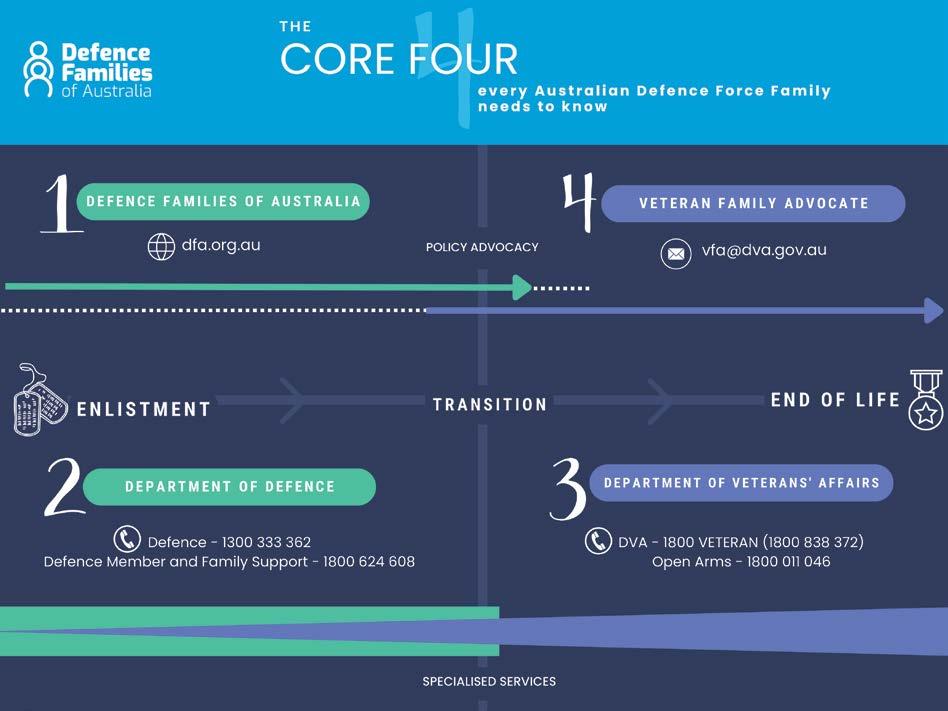
The ‘Core Four’ shows the advocacy bodies and specialised service providers for ADF members and their families during and after service.
Eight nations partnered to support the Royal Solomon Islands Police Force (RSIPF) to remove more than 3,200 Second World War-era explosive remnants across 217 sites in the largest land-based Operation Render Safe. The western province of Solomon Islands was the location of one of the hardest fought battles of the Pacific campaign – the Battle for Munda Point – and the munitions and equipment from the battle continue to pose a danger to local communities.
In its 20th year, the operation included personnel from the ADF, Canadian Armed Forces, New Zealand Defence Force, United States Army and United States Marine Corps. They were joined by observers from the British Army, Japan Ground Self-Defense Force and South Korean Navy.
Commanding Officer of 6th Engineer Support Regiment and the operation, Lieutenant Colonel Fabian Harrison, said one of the most rewarding aspects of the mission was the integration of the partner

nations. ‘It’s a really meaningful outcome to make the community safer and leave it in a better place than we found it,’ he said.
Director of RSIPF Explosive Ordnance Device Inspector Clifford Tunuki said he was thankful for the support. ‘Operation Render Safe allows us to not only strengthen our relationships with our partner nations, but to share knowledge and skills that allow us to remove these explosive threats more safely and efficiently,’ he said. ‘In 2 weeks we have removed more explosive remnants of war than the RSIPF would be able to in 6 months.’
Coinciding with it’s 50th anniversary, 8th/9th Battalion, the Royal Australian Regiment (8/9RAR) has acquired the Bunker Assault painting, which marks a seminal moment in the battalion's history. The painting, donated by the 9th Battalion Association, serves as a reminder of the courage and sacrifice of soldiers who fought in Vietnam.
The painting commemorates a defining moment in 9RAR’s tour in Vietnam. Veteran Dan Penman said after returning home, the soldiers unanimously agreed that the most significant part of their experience was the number of lives lost during the bunker assaults.
‘You need to know the past to help you see the future,’ Mr Penman said. ‘We commissioned a local painter to depict the bunkers because it was our most pivotal point and where we lost most of our guys. The soldiers in the Bunker Assault painting had hard feet, strong backs, and were able to shoot straight. Those requirements haven’t changed.’
Later this year, the battalion plans to reopen its museum to further preserve the legacy of 8RAR, 9RAR, and 8/9RAR, ensuring veterans, young and old, have a place to reflect on their shared history.
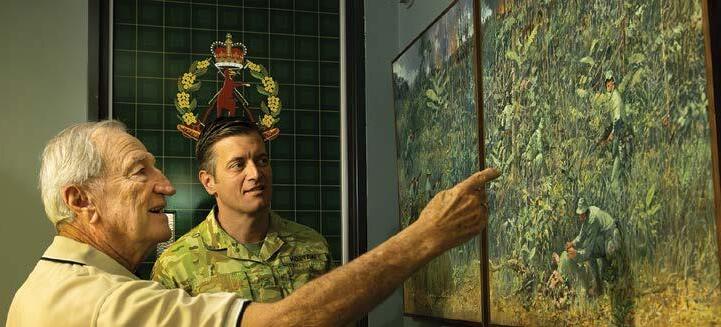
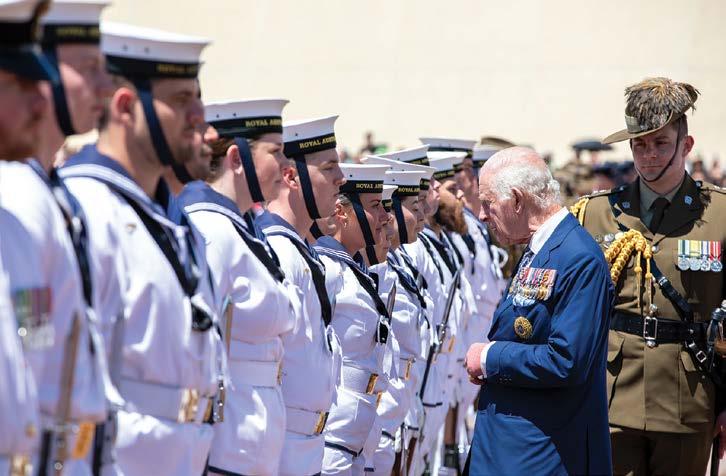
Australia’s Federation Guard was part of the Royal Guard that welcomed Their Majesties King Charles III and Queen Camilla, and members of the Australian Government to Parliament House on October 21.
As the reviewing officer, King Charles walked along the ranks of the servicemen and women, stopping to speak to personnel as he inspected their dress and bearing. The Federation Guard also fired M2A2 Howitzer ceremonial guns during a 21-gun salute to mark the King’s first royal visit as sovereign and the first visit from a reigning monarch since 2011.
Royal Guard member, Federation Guard Sergeant Major Warrant Officer Class Two Damien Timms, was in London for King Charles’
coronation last year. This year, he got to stand face-to-face with the monarch.
‘His first comment was about how I seemed to be the man with all the medals,’ Warrant Officer Timms said. ‘Getting to meet the King up close, rather than giving him a hip-hip-hooray in London, was the highlight of my career and probably my life.’ One medal in particular caught King Charles’ eye. ‘We talked about the Coronation Medal and he was glad that I’d finally received it.’
The Federation Guard led a contingent of Commonwealth nations from Westminster Abbey to Buckingham Palace for the King’s coronation last year. The 60 ADF servicemen and women who took part were awarded the King’s Coronation Medal.

The skies of Temora echoed with aviation from the past and present, with the Air Force supporting the Warbirds Downunder Air Show from October 19 to 20. The Temora Aviation Museum celebrated its long-standing connection with the ADF, with the return of one of the nation’s biggest gatherings of historic military aircraft.
Showcasing 40 aircraft over the two-day event, the air show highlighted the then, now and everlasting in Australian aviation.
Air Force planes first took to the Temora sky in 1941 with the establishment of 10 Elementary Flying Training School. At its peak, the unit managed 97 de Havilland Tiger Moth aircraft, graduating 2,400
pilots during its 5 years of operation. The Temora Aviation Museum was opened in 1999, with the Air Force taking ownership of 11 of the museum’s heritage aircraft in 2019.
The Warbirds Downunder Air Show is just one of the opportunities for the Air Force to put its heritage fleet on show – flying platforms such as the CT4A, Spitfire Mk VIII, CAC Winjeel, Lockheed Hudson, Ryan STM-S2 and Tiger Moth in varying formations, in an ode to Australian aviation history.
Also putting on a spectacle for the 15,000-strong crowd were fan favourites including the Roulettes aerobatic display team, C-130J Hercules and F-35A Lightning II.
A message from Australian War Widows Inc. War Widows Day 2024 was held on 19 October, with commemorations and events held around Australia.
This year War Widows Day was celebrated for the first time in Darwin, Northern Territory, as well as Melbourne and Wangaratta in Victoria.
The Northern Territory Government and the Minister for Veterans, Jinson Anto Charls, hosted an afternoon tea for war and defence widows at Parliament House in Darwin. Our National President, Jenny Gregory, was honoured to attend this special occasion.
In Victoria, Wangaratta held an afternoon tea for war widows from the surrounding area supported by the Wangaratta RSL Auxiliary. In Melbourne, a small group of war widows attended a high tea at the Sofitel in the city.
Queensland celebrated the day for the third year since its formal recognition by the Queensland Government in 2022. War widow groups across the state gathered for luncheons and day outings throughout October to commemorate the day. Once again, iconic landmarks were lit up in blue and white in Brisbane, Rockhampton and Townsville, and the Australian War Widows Queensland banner was proudly displayed on Caxton Bridge in Brisbane’s CBD.
In Western Australia, war widows celebrated War Widows Day with a well-attended
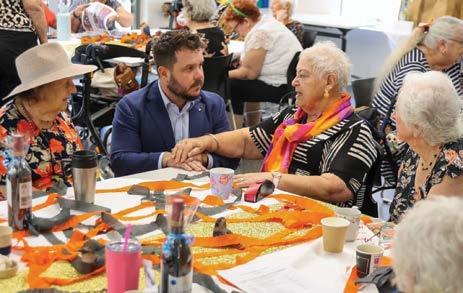
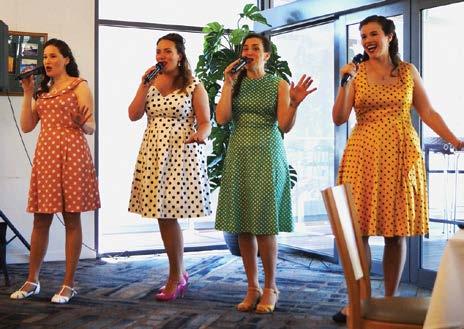
luncheon at Fraser’s Restaurant in Kings Park, Perth. In the Australian Capital Territory, 50 war widows celebrated the day with a lunch held at the Canberra Services Club in Barton. In South Australia, a service to commemorate the day was held at the Repatriation Hospital Chapel in Daw Park, followed by a luncheon.
In New South Wales, the third War Widows Day service was held at The Cenotaph in Martin Place, Sydney, followed by a luncheon.
War Widows Day celebrates the resilience and tenacity of war and defence widows and is also a sombre reminder of their service partners’ sacrifice for our nation.
As our founder, Jessie Vasey, once said: ‘We must show the general public that we remember, otherwise how can we expect them to do so?’ While war widows carry the memories of their loved ones every day, Jessie believed in the importance of making this visible to the public. War Widows Day is a powerful reminder of the profound loss experienced by families of those who served Australia and who made the ultimate sacrifice.
Jessie would be very proud to see war widows coming together to support each other and to -


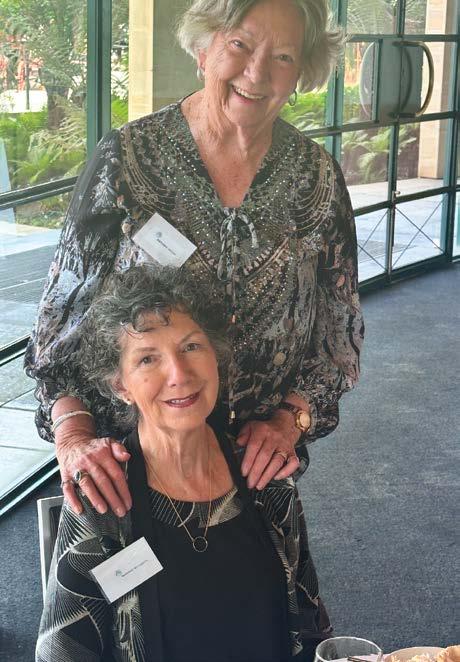
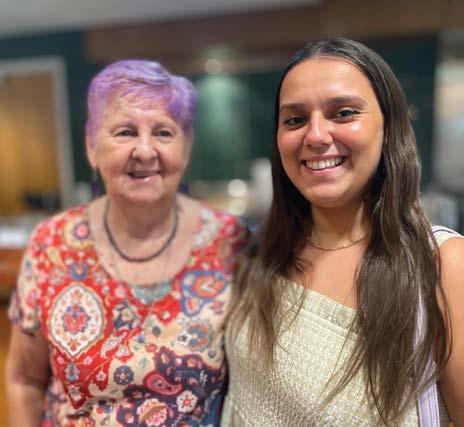
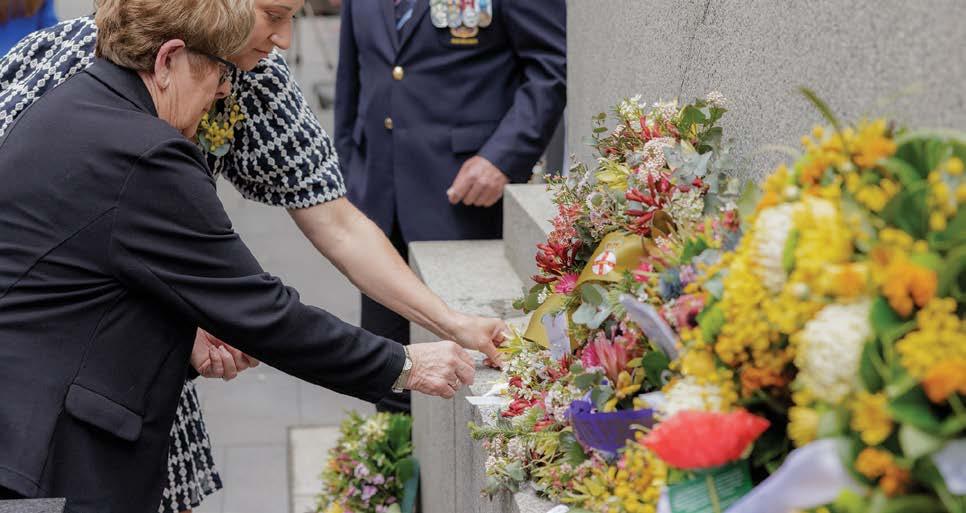
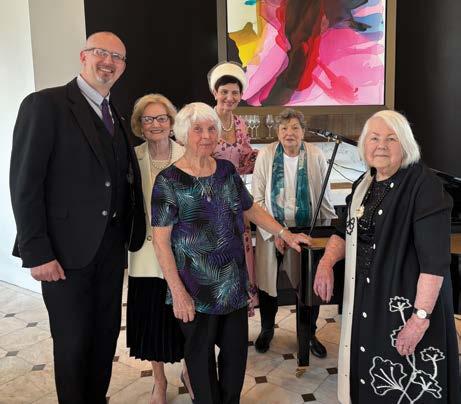


A message from The King’s Trust Australia
Celebrating the entrepreneurial achievements of Australia’s veteran and family business community, The King’s Trust Australia was delighted to announce the winners of the 2024 Beyond Service Awards.
Now in their third year, the awards recognise the depth and breadth of skills and experience veterans and Defence families bring to Australia’s small business landscape.
Chief Executive Michelle Endacott said that each year the King’s Trust is very impressed with the high calibre of nominations it receives, which speaks to the entrepreneurial spirit within the ADF community.
‘The introduction of the Rising Star Award highlights the brilliance of young entrepreneurs in the ADF community who demonstrate remarkable initiative, innovation, and resilience,’ Ms Endacott said. ‘We wish to recognise all of our award nominees for their exemplary efforts in business and as champions for the skills and experiences the Defence community bring to small business.’

Commonwealth Bank of Australia Business of the Year Award
New Mission Award
Named after the call sign for special forces water operators, The Whiskey Project Group was founded just over 5 years ago by Ryan and Darren, former Royal Australian Navy Clearance Divers.
‘Darren and I left the Navy with one mission: to provide high-performing vessels to those who continue to serve,’ said Ryan.
After much research, the Whiskey Multi Mission Reconnaissance Craft was born. The vessel is a carbon fibre combat craft with a technically advanced powerboat hull that reduces the slamming load on the water by 40 percent to help protect its operators. And within 5 years of launching The Whiskey Project Group, Ryan and Darren had inked a $40 million deal with the US Marine Corps.
Reflecting on the recognition, Ryan said: ‘What’s really important to us is proving that it’s possible to find a new mission beyond service. We continue to serve those who serve, and for that, we are proud and grateful for this recognition.’







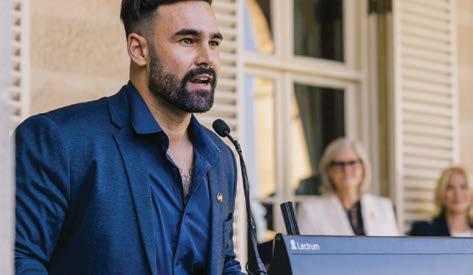
Dylan was an active infantry officer in the Australian Army when a little-known disease left him bedridden and ate away at his mental health. But one book was all it took to begin to heal mentally and to spark the idea for Brothers and Books, a charity that promotes bibliotherapy – the practice of reading to improve mental health and wellbeing.
Brothers and Books has now set up 100 community libraries, distributed up to 18,000 books throughout Australia, and has a social media reach of 150,000 people a month.
Dylan’s time in uniform set him up to run Brothers and Books with integrity and purpose. While reading gave him the idea to create the charity, it also taught him how to go about it, learning about finance, accounting, marketing and setting up a charity.
‘Changing your life could be just one book away and thanks to all of our amazing supporters, community and partner organisations, we’ve donated thousands of them,’ Dylan said.






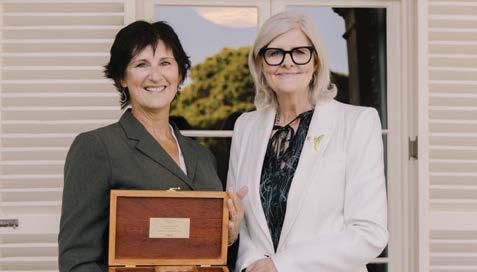

Recognising the unique employment challenges that military spouses face due to frequent relocations and the transient nature of military life, Defence partner and entrepreneur Christine Gilchrist founded Spouse Force to offer flexible, stable and meaningful employment that can move with spouses, wherever they are posted.
In its first year of operation, Spouse Force has provided more than 1,000 hours of fully remote employment to military spouses, and that number continues to grow day by day. But Spouse Force is more than just a service provider – it is also a social enterprise.
‘Our business is centred around a social mission: to empower Australian military spouses with stable, fully remote employment,’ Christine said. By supporting military families, we help maintain workforce continuity and stability in a unique demographic that faces frequent relocations and other challenges associated with military life. This commitment extends to how we reinvest our profits, prioritising social impact over profit.’
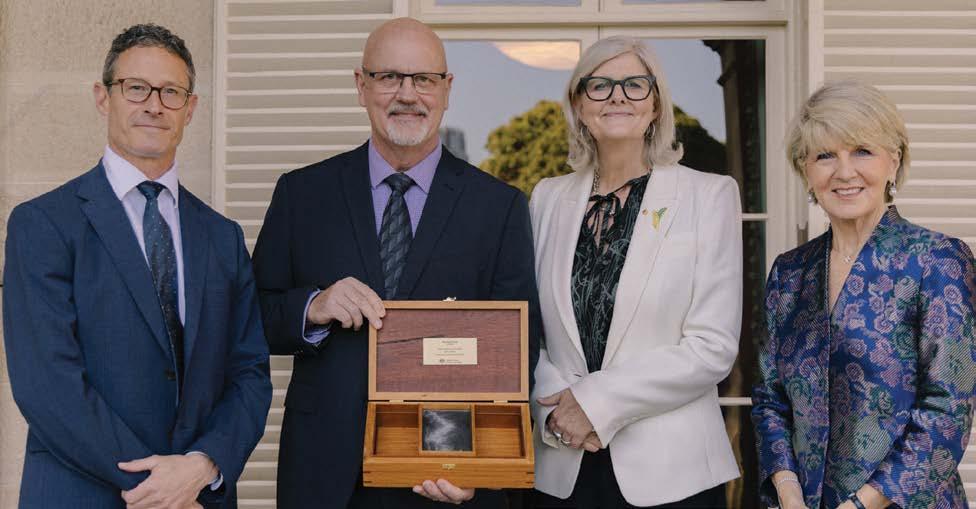
Air Force veteran and social entrepreneur Garry Harding is the CEO of EnergyFlex, which is an Australian-made, veteran-owned company that is revolutionising how Australians use energy.
The free EnergyFlex app provides a unique rating that measures how well customers use renewable energy sources. This rating, combined with personalised insights and actionable suggestions, helps them shift their energy use towards cheap, clean renewables and calculates the money and carbon emissions they could save in doing so.
‘I took what I had learnt in my Defence career –learnings about situational awareness, working with teams and understanding what is needed to make decisions – to build an app to help people save energy,’ said Garry.
Garry’s passion for sustainability and innovation is helping Australians to take control of their energy future. The Community Impact Award is supported by DVA.
(L to R): DVA First Assistant Secretary Mark Brewer AM CSC Bar, Garry Harding, Governor-General Sam Mostyn AC and ANU Chancellor Julie Bishop.
A message from Legacy
The first week of September marked Legacy Week, the organisation’s biggest annual fundraising initiative.
The ADF once again extended its generous support, with members across the country volunteering their time to help raise funds. Uniformed members were out selling Legacy badges and bears, and collecting donations from the public –all of which will go to the families of our veterans. We want to say a big thank you to all the ADF volunteers – we couldn’t have done it without you! Legacy also recently hosted a week-long camp at Wombaroo for 38 Legacy kids, giving veterans’ children across NSW a chance to get together and participate in adventure activities, including canoeing, cycling and a high ropes course. Simultaneously, their parents and carers enjoyed some respite from the daily grind at Moss Vale House, which included accommodation, meals and activities, such as yoga.
Since 1923, Legacy has been supporting the partners and children of Australian veterans who have given their lives or health for our country. We currently care for more than 30,000 beneficiaries, including 1,400 children and youth (0-26 years old) and 900 beneficiaries with a disability. Legacy believes no dependant of a veteran should suffer financial or social disadvantage because of their loved one’s death or injury from service. We are here to provide practical, emotional and social support, including relief from financial hardship, and developmental opportunities.
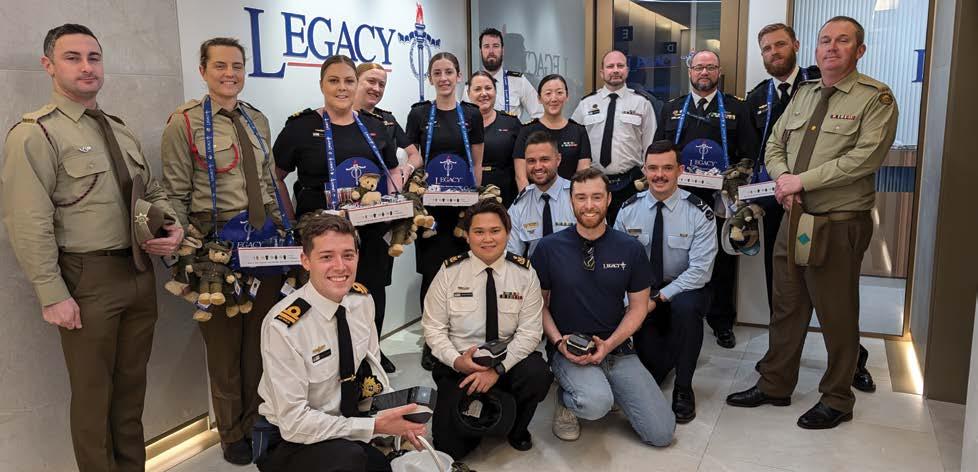
Most of Legacy’s services are delivered by volunteers known as ‘Legatees.’ Many Legatees are veterans themselves who use their military service values, empathy and practical life skills to care for Legacy families. They are the backbone of our organisation.
If you are interested in supporting our veterans’ families as a Legatee or wish to learn more, register your interest online or contact your local club for more information.
Do you or someone you know need support? Legacy is always here to help. Visit www.legacy. com.au or call 1800 LEGACY to speak with a staff member.
A message from the Maryborough Military Aviation Museum Association
In September, a new Memorial Wall to 569 servicemen who died in the Second World War was officially unveiled at the former RAAF Station Maryborough in Queensland.
The airmen trained at the former No 3 Wireless Air Gunners’ School (3WAGS), which is now home to the Maryborough Military Aviation Museum. The Memorial Wall is preservinganimportantpartofAustralia’s wartime aviation history as a legacy to the men killed in active service.
The Memorial Wall is unique in that it is located within the actual area where the school operated during the war.
Under the Empire Air Training Scheme, Maryborough was chosen as a facility for a military air base for 3WAGS and other units.
Between October 1941 and December 1944, there were 29 courses provided by 3WAGS. All students had departed from Maryborough by September 1944 and 3WAGS disbanded on 15 December 1944.
The number of trainees in each course varied between 70 and more than 100. Each month, a new intake
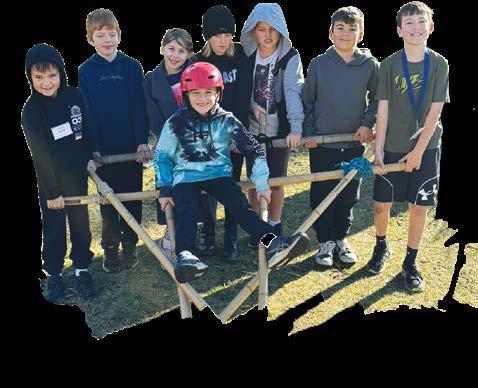
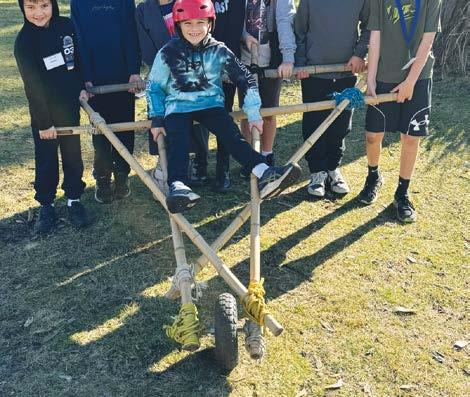
moved to a Bombing and Gunnery School at either Evans Head (NSW), Port Pirie (SA), or Sale (Victoria) to complete the gunnery component of the course.
As Wireless Operators Air Gunners or Air Gunners, they became crew members for various Royal Air Force and RAAF squadrons, and served in all theatres of the war. Those who perished died as a result of air battles, aircraft accidents or as prisoners of war.
Hundreds of hours of research has been undertaken by volunteers (veterans themselves) to identify each of the men killed in active service. The names were cross-referenced against the DVA Nominal Roll and the National Archives of Australia.
of those who trained at 3WAGS RAAF Station Maryborough. We are now trying to establish contact with as many relatives as possible. If you have any information, please contact David Geck at mmamsecretary@gmail.com or 0434 104 601, Jenny Elliott on 0447 846 317. You can also visit the Maryborough Military Aviation Museum’s Facebook page, where it commemorates the memory of each of the 569 servicemen by regularly posting their individual Roll of Honour details.
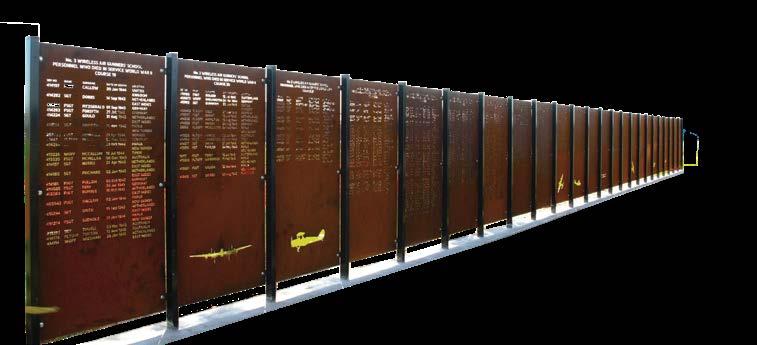

The museum association designed the Memorial Wall with the names of those 569 souls cut into 24 steel composite panels installed along the southern boundary of the museum complex site. The project was supported by a DVA Saluting Their Service grant.
The association is in contact with a very small number of local men who were there during the Second World War and has established contact with some local families who are relatives

Reviewed by Dr Patrick Mullins
Donna Bourke’s first volume of memoirs, Hidden Courage , focused on her lengthy Army career and ended with her 2016 medical discharge. Having joined the military in 1979 and serving in a variety of roles, including deployments to Timor-Leste and Afghanistan, Bourke wrote with enthusiasm about the highs of army life: the camaraderie, the purpose, the delight in learning, and the places she went.
Running throughout, however, was a more sober re-evaluation of the requirements of that career. Most prominent was the considerable systematic and individual sexism that she navigated and contended with. But following close behind was the institutional obligation that Bourke and her peers compartmentalise any aspect of their life that could affect their work as soldiers – mental health issues most of all.
The first half of this sequel memoir, No longer a soldier, traces the effects of that compartmentalising after Bourke’s discharge. The mental and physical health problems she had upon her departure are exacerbated by the bitter circumstances of her discharge and the difficulty of adjusting to life outside the institution to which Bourke had given her working years.
Who am I, she asks, if not a soldier? Without the pass-fail standard of military life, without the clear paths and hierarchies, without the urgency of orders and all-encompassing missions, Bourke grapples for some purchase.
Her memoir offers an account of the dead ends, repetitive fields, and rocky stretches that she treads through while trying to blaze her own path. There are yoga sessions that do nothing to give her peace of mind, doctors who are well meaning but ineffective, moments of respite that are too momentary.

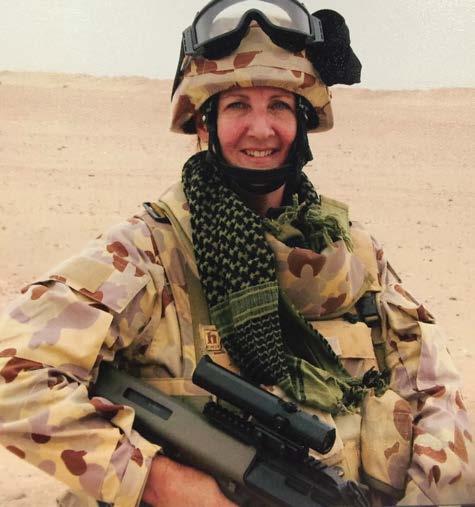
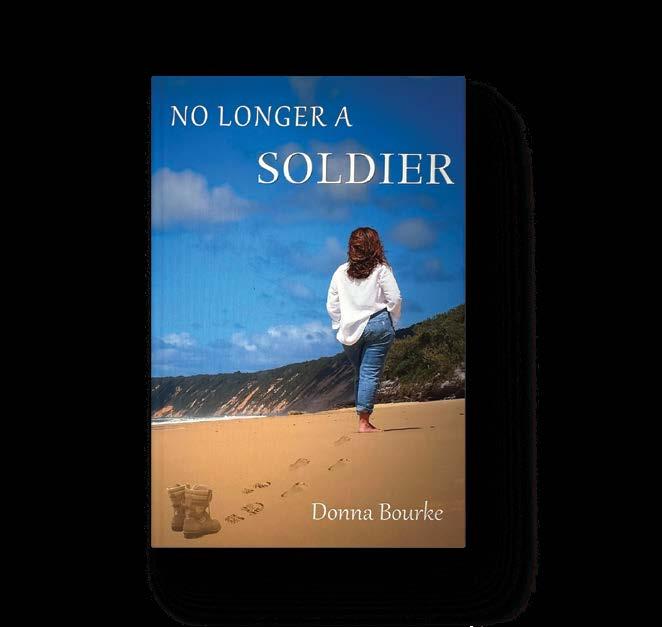
There are comic moments: availing herself of San Francisco’s liberal cannabis laws, Bourke hallucinates that she and her husband are marionettes who have lost their strings.
Other moments are darker but betray a wry self-awareness: back home, Bourke pursues a would-be thief across a paddock as though she is still in Afghanistan, ‘facing the Taliban’. Then there are the moments that are inadvertent and passing but prove more important: while moving house, Bourke packs the mementoes of her career into a box that she leaves, in the new house, unpacked. ‘Out of sight, out of mind,’ she writes. No longer a soldier is not always a fluent read, and some diversions are unnecessary padding. But, in its messy trajectory, Bourke’s memoir dramatises the search for an answer to who and what she is, now, outside of the military.
That she has repeated the problem of compartmentalising comes to Bourke only at the
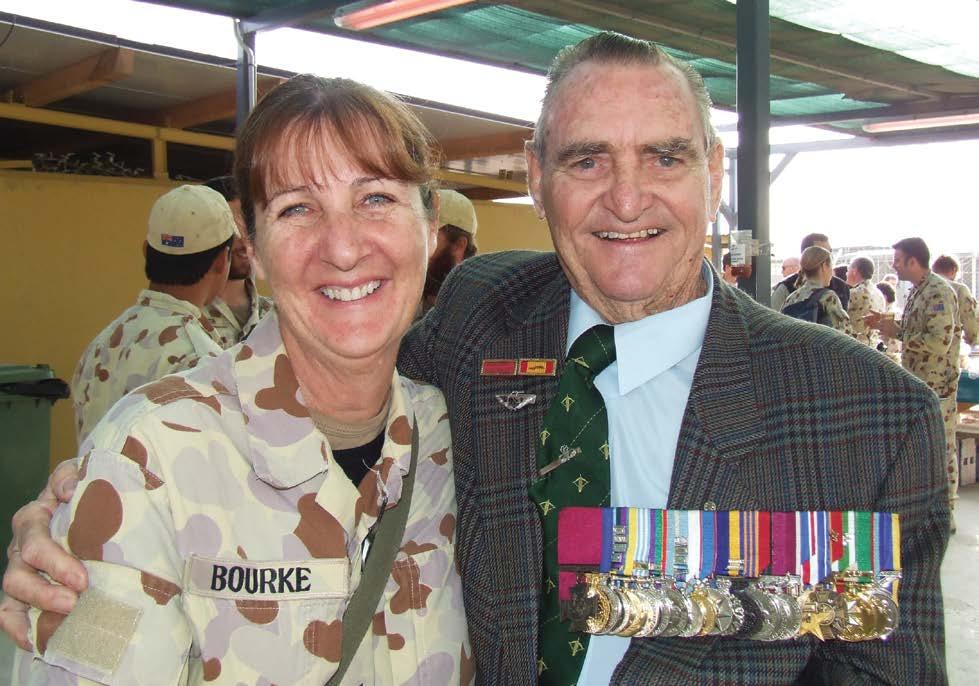
end, when she unpacks that box of mementoes – awards, photos, reports – and realises that the conclusion of her Army career does not define the whole of that career, nor define her now. ‘My career wasn’t insignificant just because I had been medically discharged,’ she writes. ‘…I may no longer be a soldier, but I am unapologetically, proudly, and imperfectly me .’
The second half of No longer a soldier consists of accounts by 5 other soldiers of their transition from military to civilian life. While preserving an individual and subjective character, the striking similarities of these 5 accounts lend Bourke’s final realisation about herself a retrospective, greater weight.
The journeys of Bourke and her 5 fellow veterans are not over, but in their clear-eyed apprehension of who they are now, in the military and outside of it, there is something important: a sense that their futures are theirs to make.
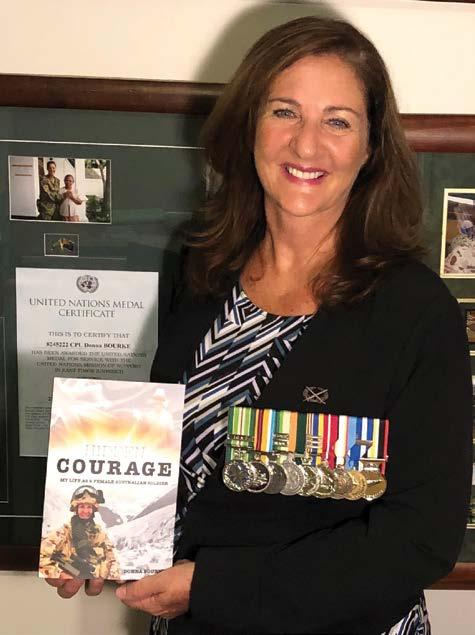
The following books, often self-published, have been written by, for and with veterans. The books and their descriptions are submitted by authors and readers. DVA takes no responsibility for the accuracy of their content or the opinions expressed in them
By various contributors

In the early years of the Second World War, Australian women began lobbying to contribute to the nation’s wartime effort. From 1940, women were signing up to serve in the RAAF Nursing Service. In 1941, an auxiliary arm of the RAAF was established, allowing women to join on a temporary basis to enhance the organisation’s ability to fight. In the decades since, Australian women have continued to contribute significantly to the operational capability of the world’s second-oldest air force. This book includes the personal stories of some of these women recounting – in their own words –their experiences while proudly wearing the uniform.
• Pages: 368
• Cost: $19.99
• To buy: Major bookstores, online bookstores and as an eBook.
By Kathryn Spurling

On 5 May 1998, the RAN replenishment ship HMAS Westralia proceeded to sea. As the engines were brought to full power, hoses burst, flames erupted and thick, black smoke filled the engine room. The crew fought bravely to save their ship but were unable to save 4 of their shipmates. The human cost was lost in the battle and blame game between different government departments and private companies. The families wanted the truth and genuine compassion but their hard-fought battle for justice revealed a labyrinth of innuendo concerning fraud, nepotism, dishonesty, incompetence and official cover-up. Who was responsible? And would they be held accountable?
• Pages: 163
• Cost: $37.95 (includes Australian tracking postage)
• To buy: kathrynspurling.com
By Anthony ‘Harry’ Moffitt
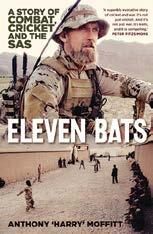
Anthony ‘Harry’ Moffitt spent more than 20 years in the SAS. Harry’s decades of service and his multiple tours in East Timor, Iraq and Afghanistan made him one of the regiment’s most experienced and recognised figures. An improvised game of cricket was often the circuit-breaker Harry and his team needed after the tension of operations. He began a tradition of organising matches wherever he was sent, taking a cricket bat with him on operational tours, 11 of them in total. Those bats form the basis for Harry’s extraordinary memoir.
• Pages: 366
• Cost: $34.99
• To Buy: Allen and Unwin and other book sellers.
By Darren Prickett

During the First World War, more than 4,000 Australian servicemen were taken prisoner. Yet the prisoner of war experiences of the Anzacs are frequently forgotten. Where individual stories have been told, they are often from the perspective of life as a POW. It could be assumed that the Australian POWs of the war passed quietly into captivity, when the opposite was the case. Many of the Anzacs attempted escape, with more than 40 successfully making their way to England or across the battlefields to Allied lines – to ultimately score successful home-runs!
• Pages: 392
• Cost: $32.99
• To buy: Simon and Schuster and Big Sky Publishing
By Christine Helliwell

A small number of British, Australian and New Zealander operatives, known as Z Special Unit, went into Borneo in the final months of the Second World War. They were given the difficult mission to reconnoitre to assist in the imminent landing of Allied troops, to liaise with the native Dayak population, and to harass the Japanese troops. The operation was named Semut, a Malay word meaning ‘ant’, and the group turned out to be very aggravating ants for their Japanese foes. Meticulous research has gone into the book, which concludes that without the Dayaks, the whole operation would have collapsed.
• Pages: 562
• Cost: Around $40
• To Buy: All good bookstores
By Nicholas Floyd and Paul Stevens

On 1 August 1871, the colony of New South Wales raised its first permanent battery, known as the NSW Artillery. In the following years, Australian gunners have served in war and peace, abroad, and in the defence of Australia, with honour and dedication. 1 August 2021 marked a century and a half of unbroken service to the nation by Australia’s gunners – volunteer, militia, reserve, permanent and regular. This story is in an easy-to-read format, with plenty of pictures and maps, recounting the way our gunners have done their job.
• Pages: 265
• Cost: $23 per copy or $300 for a box of 20 copies, both prices include postage
• To buy: Royal Australian Artillery Historical Company: www.artilleryhistory.org
By Ben Wadham and James Connor

This book is the first independent study of military institutional abuse from 1969 to 2011. There have been around 35 reviews and inquiries into military culture in Australia since 1969, and reporting of military misconduct continues to grow, mostly regarding bastardisation, sexual harassment, women’s participation, and the wider question of institutional abuse in churches and schools. This book seeks to give voice to the survivors, their families, friends and those affected by this phenomenon. It is also a tribute for those that are no longer with us – many who fought the system to get the acknowledgment and support they so needed.
• Pages: 277
• Cost: $36.99. Bulk discounts for orders placed by 31 December 2024.
• To buy: email Dominika.greinert@unimelb.edu.au
By Rod Henderson
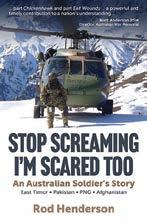
Stop screaming, I’m scared too is not what you’d expect to see on the back of a loadmaster’s helmet in a Chinook helicopter flying over Afghanistan, but for Rod Henderson it sums up his 22 years of service as a soldier in the Australian Army. This is the extraordinary memoir of a regular Australian soldier. The little-known stories of ordinary soldiers deserve to be told and Rod reveals the depth of his soldiering experiences with humour, humility, self-reflection and honesty.
• Pages: 322
• Cost: $32.99
• To buy: Amazon and all book sellers. For a personalised signed copy, visit www.rodhendersonauthor.com.au.
If you have a book for a subsequent edition, please email vetaffairs@dva.gov.au. Please provide the following: title, name of author, blurb (short description that we reserve the right to edit), price, how to buy it, and image of the front cover. Submitting a book does not guarantee publication.
The Interpretive Pavilion in the Sandakan Memorial Park in Sabah, Malaysia, will be re-opened to the public early next year following its rebuild and the upgrading of the exhibition.
The Sandakan Memorial Park is located adjacent to the site of the Second World War prisoner of war (POW) camp. From 1942 to 1943, some 2,700 Allied servicemen were interned at Sandakan, the great majority of whom had been captured after the fall of Singapore in 1942. The POWs were used as labour to construct a military airstrip and its service roads.
The Sandakan Memorial Park commemorates the death of more than 2,400 Australian and British POWs, at Sandakan, on the death marches, and at Ranau. Only 6 POWs survived the death marches – all Australians – and these men were later able to attest to the atrocities and brutality inflicted by the Japanese. Many locals also risked their lives to help the POWs and escapees.
The original pavilion, built in 1999, had deteriorated in the tropical conditions and to ensure the continued safety of visitors, the pavilion was rebuilt. The Australian Government announced a funding of $5.1 million to upgrade the pavilion in the 2022-23 Budget. The new Interpretive Pavilion incorporates features from the original building, including the front iron gates and stained-glass window, while reclaimed timber has been used for seats and floorboards.
The interpretive content has also been refreshed to convey the experience of those who endured atrocities at Sandakan. The central feature of the exhibition will be a column representing the ‘Big Tree’, which towered over the huts and was a landmark of the Sandakan POW camp.
Anzac Day services are held at the Memorial Obelisk within the park and DVA also supports the Malaysian Government with its Sandakan Memorial Day service on 15 August each year. Both events are free and open to the public. For more information on the Sandakan Memorial Park, visit the DVA website (Search for ‘Sandakan Memorial Park, Malaysia’).
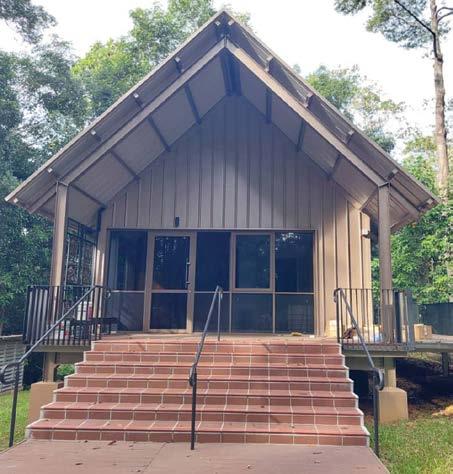
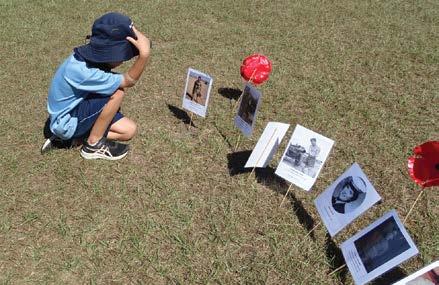
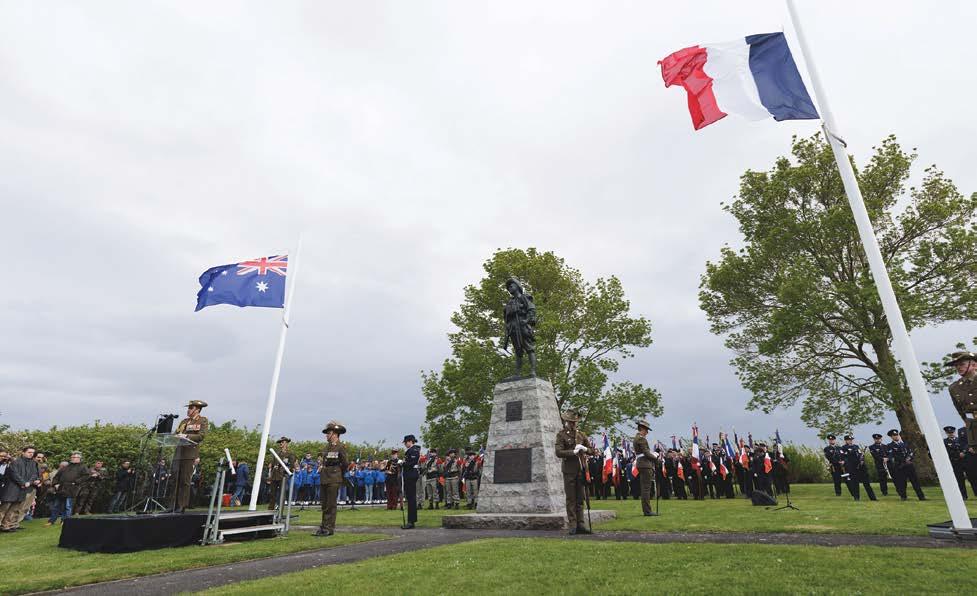

Australians planning to honour the fallen at the 2025 Anzac Day Dawn Services in Türkiye or France can now register for their free attendance passes at commemorations.teg.com.au.
Registration is essential.
Services in Türkiye and France will be held on the 110th anniversary of the start of the Gallipoli campaign and will recognise all who have served our nation in conflicts and peacekeeping operations.
The Dawn Service in Türkiye will be held at the Anzac Commemorative Site at Gallipoli, followed by a mid-morning Australian Memorial Service at Lone Pine.
The Anzac Day Dawn Service in France will take place at the Australian National Memorial near Villers-Bretonneux, followed by a service at the Digger Memorial, just outside the town of Bullecourt. Local French authorities will also hold a series of smaller additional services in Villers-Bretonneux and Bullecourt throughout the day.
Australians travelling to attend the services in Türkiye and France are encouraged to ensure they’re familiar with their entry requirements and monitor smartraveller.gov.au for the latest travel advice.
Those unable to attend the international services will be able to watch the live broadcast on ABC television.
Each year, DVA runs the Anzac Day Schools’ Awards, a national competition that recognises the work of students, teachers and schools who engage with veterans to learn about service and sacrifice and honour Australia’s wartime history.
This year’s theme, Discover the stories of veterans in your local community, encouraged students to seek out veterans and learn about their experiences and life stories.
The entries showed a deep and empathetic understanding of the lives of those who have served or are still serving. Students also showcased their creativity and storytelling, with diverse and interactive entries that comprised websites, songs, artwork, dioramas, crochet, poetry and even an escape room.
The national winner, St Patrick’s College for Girls, in Campbelltown, NSW, received $5,000, a plaque and certificates. State and territory awards worth $3,000 each were presented to 8 schools. A further 5 schools received special category awards.
A total of $39,000 in prize money was awarded this year.
Entries for the 2025 Anzac Day Schools’ Awards are now open, with next year’s theme Remembering Gallipoli: 110 years
For more details, please visit the DVA Anzac Portal (anzacportal.dva.gov.au).
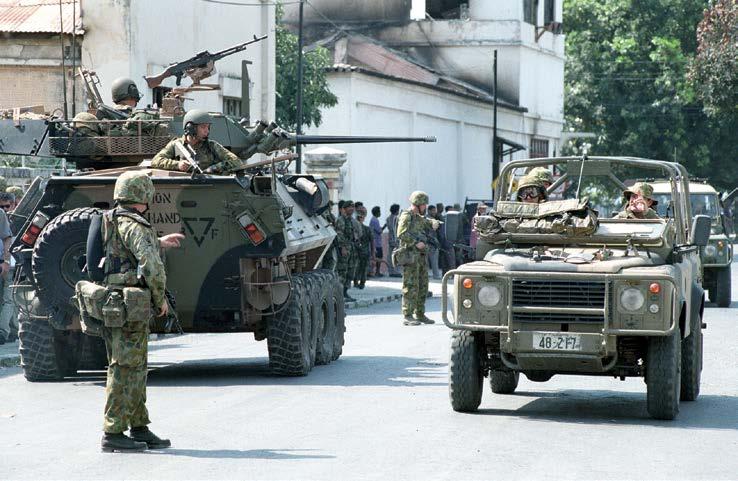
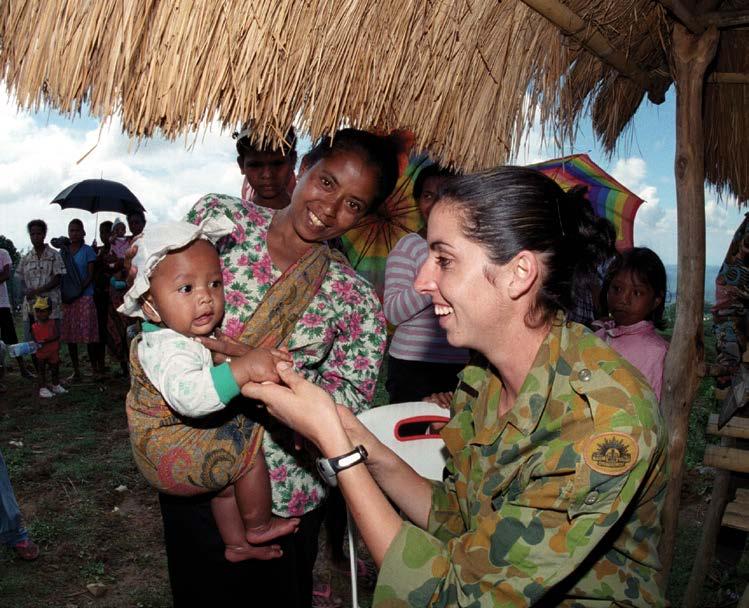
In September, Australians reflected on 77 years of our nation’s involvement in peacekeeping operations and commemorated 25 years since the beginning of Australian service in Timor-Leste.
To honour the 25th anniversary, a National Commemorative Service was held at the Australian Peacekeeping Memorial in Canberra on 20 September.
The anniversary provided the opportunity to commemorate the service of all Australian men and women who served in Timor-Leste, and the sacrifice of their families. Tragically, 6 Australians lost their lives while deployed, or as a result of their service, in Timor-Leste.
The commemorative service was attended by more than 500 people, including dignitaries, and
watched live on ABC television by another 135,000.
When arriving in East Timor it was difficult to see the destruction. Although the days were long, both physically and emotionally demanding, it was an honour to serve.
– Jody Hillier, Air Force veteran and INTERFET peacekeeper
Just a week earlier, we marked National Peacekeepers Day. Australia has contributed to more than 70 international peacekeeping operations in over 60 countries. Tens of thousands of Australian military personnel, police officers

and civilians have served in peacekeeping roles. Sixteen Australians have lost their lives while serving on these operations.
While on an official visit to Timor-Leste, Minister for Veterans’ Affairs Matt Keogh said that when the Timorese people took the courageous step of voting for independence in 1999 and asked the international community for help to secure their nation, Australia answered.
‘Led by General Sir Peter Cosgrove from 1999–2000, the International Force East Timor (INTERFET) remains Australia’s largest peacekeeping mission to date, and at the time was our largest overseas military deployment since the Vietnam War,’ Minister Keogh said.
‘It was an honour to mark this significant milestone alongside General Cosgrove and a number of ADF veterans who returned to Timor-Leste, very fittingly on the 77th anniversary of Australian Peacekeeping.’
In the middle of the night, my platoon was attacked by the enemy, the fiercest attack on an Australian military outpost at the time. The smell of grenades and rounds of ammunition fired into the compound was still in the air.
– Mohammed Abdur Rahman, Army veteran and UNTAET peacekeeper
In June 1999, the United Nations Mission in East Timor was mandated to conduct a referendum to determine whether the East Timorese people would accept special autonomy within Indonesia, or whether they would vote for independence. On 30 August, 92.5 per cent of registered voters cast their ballots, resulting in a resounding defeat of the ‘special autonomy’ proposal.
Tales of Timor is a series of stories encompassing personal experiences and reflections of veterans who were in Timor-Leste and offers readers the chance to learn more about our peacekeeping efforts to help with the humanitarian and security crisis that took place. The series includes interviews with veterans of various ranks, images of them undertaking their peacekeeping duties, and photos showing how Australian troops filled their rooms with memories from home. You can read the Tales of Timor stories on the DVA website (search for ‘Tales of Timor’).

Following the referendum, pro-integration groups (militias) began a campaign of violence and destruction across East Timor. On 14 September 1999, Indonesian President Dr B. J. Habibie formally requested a UN-mandated multinational force to deploy to East Timor and assist authorities in maintaining security.
Australia led the response with INTERFET to restore peace and security, and to protect and support the United Nations’ humanitarian assistance operations. Between 20 September 1999 and February 2000, Australia contributed more than 5,500 of the 10,000 troops from the 22 countries involved.
In Dili, Timor-Leste’s capital, Minister Keogh attended a commemorative ceremony where he laid a wreath on behalf of Australia at the future International Peacekeeper Memorial site, and renewed the commitment of friendship between Australia and TimorLeste on behalf of the Australian Government.
It was an incredible sight to see so many Timorese people lined up along the dirt roads from 5 am, dressed in their Sunday finest going to pass their vote.
– Martin Hess, Australian Federal Police veteran and UNAMET peacekeeper
Speaking at the National Service, Minister Keogh said that Timor-Leste had made enormous progress since 1999.
‘For 25 years, East Timorese children have come of age in a peaceful and independent nation,’ he said. ‘Australia is proud to have played a part in that journey. We are thankful for the service and sacrifice of the Australian personnel who made it possible.’
The majority of Australian service in Timor-Leste spanned between 1999 and 2013 and encompassed ADF, Australian Federal Police personnel, and civilians. A number of Australians continued to serve after 2013, with ongoing efforts still in effect to this day.
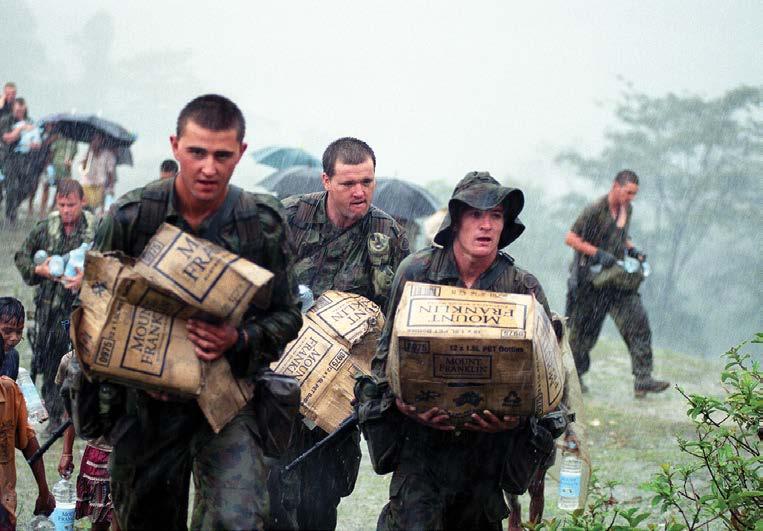
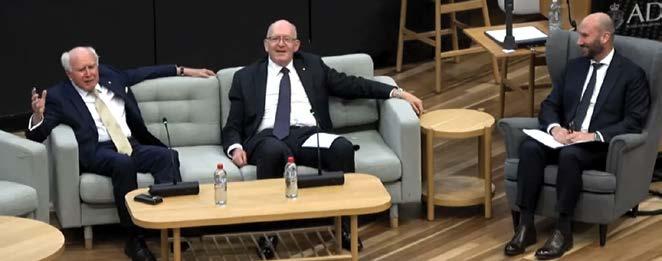
The pathway to peace and solidarity: Australian service in peace operations seminar was held at the Australian Defence Force Academy to mark the 25th anniversary of Australian service in TimorLeste. Facilitated by Repatriation Commissioner Khalil Fegan DSC AM, the full-day seminar featured a line-up of noteworthy speakers, including General the Honourable Sir Peter Cosgrove AK AC (Mil) CVO MC (Retd), Former Prime Minister, the Honourable John Howard OM AC, and Lieutenant General Peter Leahy AC (Retd).
The day provided a platform for ADF and Australian Federal Police personnel and other senior leaders to reflect on the experiences they had during peacekeeping operations in East Timor, now Timor-Leste.
Opening the proceedings, Commissioner Fegan, who served in East Timor, said that it was a fundamentally impactful experience. ‘For most of the young men and women from an array of nations and organisations who deployed, this would be their first experience of peacekeeping. Personally, this experience was an awakening,’ he said.
The highlight of the event was a conversation between Sir Peter Cosgrove and former Prime Minister John Howard, who reflected on their pivotal leadership roles during this crisis.
‘As Prime Minister, I encountered a remarkable group of men and women at the ADF leadership level,’ Mr Howard said. ‘It’s always been by my judgment that what was crucial to the success of the intervention was the remarkably low level of casualties.’
Sir Peter, who commanded INTERFET, compared the mission to handling a large, quite vigorous dog: ‘You had to hang onto the collar hard from time to time,’ he said. ‘I was so thrilled when we got a Chapter 7 [United Nations] mandate, which basically said “You have the ability prosecute anybody who is not obeying the mandate – disarming, being obedient, and doing as you tell them – and the more we had that, the less violence we had to use”.’
The key themes of the seminar included veterans sharing their experiences during their deployment, as well as discussions around the ongoing connections and relationships established and strengthened with our allies during the operation. Participants also delved into the important relationship between the ADF and Australian Federal Police, and how they worked together to achieve their common goal in Timor-Leste.
To watch the seminar recording, visit the DVA website

The Australian War Memorial has switched on the largest Geothermal Heat Exchange system in the country, designed to provide sustainable heating and cooling across the Memorial’s buildings and exhibitions for the next 80 years.
The new system uses the ground’s thermal mass and relatively consistent underground temperature throughout the year to provide heating and cooling instead of using natural gasfired boilers and chillers.
This world-class, sustainable green energy project is a purpose-built Central Energy Plant that dramatically reduces energy costs and greenhouse gases. It could save the Memorial up to $1 million dollars each year
compared to the energy costs of a conventional system.
The system features 216 vertical closed loop boreholes drilled up to 150 metres deep across the Eastern Precinct, including under the Memorial’s CEW Bean Building, the bus park and grounds. It involves some 128 kilometres of pipe, making it one of the largest systems of its kind in the world. The new infrastructure will also reduce emissions by 1,400 tonnes of
Take a moment to reflect on Australia’s military history as you piece together one of our brand new jigsaw puzzles. Exclusive to the Memorial Shop, these 1,000-piece puzzles feature iconic imagery from the Australian War Memorial’s collection. Available in 4 designs:
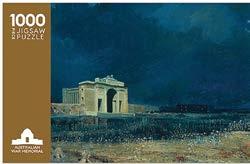
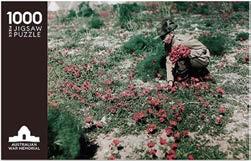

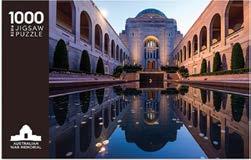
$29.99 each + postage
1,000 pieces. Finished jigsaw size 58.4 cm x 73.6 cm. All 4 sold separately. Recommended for ages 12+.
Visit shop.awm.gov.au or call the Memorial Shop team on (02) 6243 4555 to place an order.

CO2 equivalent each year – the same as cutting emissions from the travel of around 87,500 students from Sydney to Canberra return for their visit to the Australian War Memorial.
This new plant will contribute to ensuring the sustainable ongoing operation of the expanded Memorial, with the overall War Memorial Development Project due for completion in 2028.

Army Apprentices School 30th
Intake – 50th Year Reunion
31 January 2025, South East QLD
An expression of interest is sought from members of the 30th Class AAS 1975 for our 50th reunion. The dates for this event are yet to be finalised. Please advise Don if you are considering attendance. Further information will be sent to you as it comes to hand.
Contact: Don Hewett
0411 429 168
dhewett5865@gmail.com
HMAS LEEUWIN (JRTE) 50th
Intake – Marks/Morrow/Howden
7–8 February 2025, Adelaide, SA
We are excited to extend a warm invitation to all members, their partners and training staff to join us in celebrating the 50th anniversary of the mighty JRTE 50th Intake. Please make contact via Facebook or email to express interest.
Contact: Max Cook
marksmorrowhowden@gmail. com
Facebook: Marks Morrow Howden 50th intake H.M.A.S. LEEUWIN JRTE
30th Intake Army Apprentices 50th reunion 1975–2025
8 February 2025, Maroochy RSL, QLD
Planning is in progress for the reunion of our intake. All members and partners are welcome. Details can be found on the 30th Intake Army Apprentices Facebook page or by contacting the organising Chair.
Contact: Colin Ferguson cfs.sailing247@gmail.com
RAAF 19 Apprentice Intake (SNAILS) 60th Anniversary
24–27 April 2025, Wagga Wagga, NSW
The main events will be the Anzac Day march on the 25th and a Reunion Dinner on the 26th at the Wagga RSL. Other events include a meet & greet (TBA) on the 24th, a post-march lunch at Romanos on the 25th, and dinner at Crystals Chinese Restaurant on the 27th.
Contact: Graeme Oxley
0413 135 779
gaoxley19@gmail.com
HMAS Sydney IV Commissioning Crew 42nd Reunion
21 February 2025, Fremantle, WA
All Commissioning Crew members and their partners are encouraged to attend.
Contact: Derek Leecroft
0409 632 961 magpielxii@gmail.com
RAN Servicewomen Reunion 14–16 March 2025, Hobart, TAS
All current and ex-serving ladies are invited to attend. Afternoon Tea on Friday, Reunion Dinner on Saturday and Richmond Day Trip
on Sunday. The events are ladies only (unless you have a registered carer), however partners/carers are welcome to join the Richmond Day Trip. Please email for further information.
Contact: Cindy Gallahar 0416 086 080 nwtas25@gmail.com
RAAF 17th Apprentice Intake (Lizards) – 60 Year Graduation
18–20 March 2025, Nelson Bay Bowling Club, NSW
A reunion to celebrate 60 years since the graduation from Wagga Wagga in 1965. There will be a welcome function, a reunion dinner and a farewell breakfast. Registrations will be sent late 2024. Please make contact if you are not on the Lizards mailing list.
Contact: Leigh (Stretch) Marshall 0438 110 451 stretchlizard@gmail.com
Call the Hands, Call the Hands!!
4–6 April 2025, Barossa Valley, SA
There will be a 50th Year Reunion of Stevo/Ramsay 51st Division in South Australia at the Barossa Valley on the weekend of 4–6 April 2025. All Ex Stevo/Ramsay 51st and their partners are welcome to attend. Contact Paul Behne for more information on accommodation and details.
Contact: Paul Behne 0438 557 078 paulthesalt@hotmail.com
HMAS Leeuwin 83rd intake
3 May 2025, Adelaide, SA
We would like to invite all members, partners and training staff to our next reunion; details, venue and time TBC.
Contact: Scott Adkin 0407 651 086
clarke83reunion@gmail.com https://www.facebook.com/ groups/15878348778
Naval Stores Reunion 2025
16–17 May 2025, Sydney CBD, NSW
The reunion is for ex and serving Naval Stores personnel of all ranks. Booking forms are now available, along with polo design.
Contact: Alan Cady-Ellis 0407 436 498 runthruit1@yahoo.com.au
6 RAR Association
6–8 June 2025, Brisbane, QLD
Celebrating 60 years of 6 RAR. For more information or to register your attendance, please call or email.
Contact: Allan Whelan, Secretary 0427 632 402
wheels6rarassn@gmail.com
RAAF Equipment Musterings
5 July 2025, CSI Ipswich, QLD Any Equipment-related Mustering or Logistics-related Mustering personnel, both ex and current, are invited to attend our bi-annual reunion. Contact us via email for details.
Contact: Greg ‘Jacko’ Lyons (ex CLKSPLY) 0413 700 298 raafequiporeunion@gmail.com
Officer Training Unit, Scheyville Class 1/65 Diamond Jubilee Reunion
14–18 July 2025, Maroochydore, QLD
The focus will be on Wednesday 16th, the anniversary of our arrival at OTU Scheyville in 1965. This day will include a commemorative service, graduate lunch and gala dinner. Other activities are planned during the week. We welcome all graduates as well as wives/partners of those no longer with us. We also want to hear from any Directive Staff who were mentors/instructors of that class in the second half of 1965.
Contact: Laurie Muller or David Beasley 0418 788 493 or 0409 441 123 lcmuller@bigpond.net.au or dugara@bigpond.net.au
3RAR Back to Woodside Reunion 2025
24–26 October 2025, Hahndorf Discovery Park, SA
We are bringing together members, family and friends of the 3rd Battalion Royal Australian Regiment ‘Old Faithful’. There will be a meet & greet on Friday 24th, dinner on Saturday 25th and lunch on Sunday 26th, all located within the Discovery Park. Accommodation is available at discounted rates for a limited time. To register your interest and for further details, visit the website.
Contact: Ken Nash 0437 335 438 nashywoof3@gmail.com www.3rarback2woodside.com
Air Defenders Malaysia
10 November 2025, Adelaide, SA
Reunion during the week of Remembrance Day 2025 to mark the 60th Anniversary of the introduction of National Service in 1965, the raising of 110 LAA Battery at Woodside in 1965 and many National Servicemen celebrating their 80th Birthday in 2025.
Contact: Bob McEvoy
0412 310 947
bottleart19@gmail.com
JR Reunion – NAVY (Tingira Boys)
10–14 November 2025, Fremantle, WA
Hosted by the Tingira Australia Association.
Contact: Mark Lee
0417 223 040 tsec@tingira.org.au www.tingira.org.au
Robert Barr Windlow, Service No. 1263
Thank you to members of the public for the return of Robert’s British War Medal and a Memorial Plaque. We are now just seeking his 1914–1915 Star (no 22305) and his Victory Medal (no 24291). He served with the 14th Australian Field Artillery Brigade and was killed in action in France in 1917.
Contact: Neroli Ferguson (nee Windlow) 0427 140 451 anferg@bigpond.net.au
Gordon Graham Paul, QX 15256
Gordon was from Cairns, QLD, and his Second Word War medals are believed to be in a large frame with his slouch hat and a photo. The immediate family would like them returned to their rightful owner. Last known location is in the Cairns region.
Contact: Carolyn Paul (daughter) carolyn_paul@iinet.net.au
VX44887 W M Maloney 1939–45 Star, 1939–45 War Medal, 1939–45 Australian Service Medal, Africa Star, Pacific Star, Burma Star.
Contact: Kerry Maloney 0417 107 784 kerrymaloney6@bigpond. com
STUCKEY G A VX40269
Second World War medals, including Military Medal, lost in Melbourne in the 1950s.
Contact: Margaret Stuckey 0447 879 925 margaretstuckey10@ gmail.com
Herman Edward Harvey 9th Lighthorse Regiment 1027
Trying to locate medals for Herman: 1914/15 Star, British War Medal and Victory Medal.
Contact: David Coad 0417 868 325
Albert Harvey 10 BN AIF
Trying to locate medals for Albert, regimental number 1949: British War and 1914/15 Star.
Contact: David Coad 0417 868 325
CPL Ambrose Thomas Power VX52000
Australian Army. Born in Melbourne on 18 May 1902. Next of kin: Mary Power.
Contact: Lindsay Guerin lindsayguerin0@gmail. com
Pt H Gunn and Harold H Speed
3100 Pt H Gunn, 24 Bat AIF, 1914–1918; and VX 75474
Harold H Speed, 1939–1945 Defence Medal. These First and Second World War medals were handed in to the Upper Beaconsfield RSL Sub-branch.
Contact: Eric Chaplin 0408 998 010
Vernard Howard
I have found the 1945 Star and Medal for VX37362 CPL Vernard Velego Howard (Velejo on his birth certificate), 2/17 Btn, and I am keen to return them to his family. CPL Howard was stationed in Crete.
Contact: Ian Pilbeam 0438 367 228 ian.pilbeam@outlook.com
Frank Anthony Hardy and Kevin Hardy
I have 4 medals for Frank Hardy, who was from the Leichardt area of Sydney; one from the Boer War and 3 from the First World War. I also have 4 medals for Kevin Hardy, who lived in the Cronulla area, from the Second World War.
Contact: Jeff Townsend jtownsend48@optusnet. com.au
These notices have been provided by readers of Vetaffairs. DVA takes no responsibility for the accuracy of the information they contain.
You may also wish to visit the Defence Department Honours and Awards page for information on applying for medals, replacements and relatives’ medals (defence.gov.au/ adf-members-families/honours-awards).
Rooty Hill & District Naval Association
We would like to welcome new members to our Association. We meet on the last Sunday of the month at West Tradies, Woodstock Ave, Whalan, NSW.
Contact: Bob Cooper OAM 0418 629 846
bobanne1@optusnet.com.au
The Box Hill Sub-section of the Naval Association
The Sub-section meets quarterly at the Box Hill RSL on the 2nd Friday of the month at 10.30 am. Expected dates for 2025 are 14 February, 9 May, 8 August and 14 November. We invite all ex-Navy personnel and families, and those interested in all things Navy. Please let us know if you are attending lunch following the meeting as we need to book.
Contact: Joy
0406 349 712
etri1008@hotmail.com
https://navalassoc. org.au/membership/ naa-membership-types
Naval Association Maroochy Waters
We meet at the Maroochy RSL Sub-branch on the second Sunday of each month at 10:30 am. All Navy and Merchant Navy comrades, and connected family, are encouraged to join us and contribute to the growth of our service organisation.
Contact: Bill Hayward (RAN) / Michael Wilson (Merchant Navy) 0411 024 985 / 0457 852 122 bloggshayward@yahoo.com, naamaroochy@outlook.com
ARMY
Certa Cito 100 – calling all Signallers
The Royal Australian Corps of Signals (RA Sigs) is celebrating 100 years of service in the Australian Army and to the nation. A ceremonial parade and commemorative service have been organised for 14 February 2025 at the Shrine of Remembrance in Melbourne to launch the centenary year honouring the achievements of RA Sigs.
Contact: RA Sigs Corps Planning Staff
certa.cito2025@defence.gov.au
https://rasigs.org/event/ certa-cito-100-launch/
Seeking RAASC 3411642
Sgt W (Bill) J Grace Ex SVN and Singapore service.
Contact: Bob Shiels 07 3857 3865
jestercasual@gmail.com
Nasho Fair Go, Victoria Members’ meetings are 13 February and 22 May 2025 and a get together on Anzac Day 2025 after the march.
Contact: Chris, Secretary crhallen961@gmail.com
Roger D Thorpe
Seeking my mate Roger, whom I served with from 1969 to 1972. He was best man at my wedding in 1971. Last I heard of him was at Bilimba workshop in 1974.
Contact: Les Hill
0437 387 660 lynles@outlook.com
14th Intake Nashos
Looking for all Nashos from the 14th Intake, October 1968, who were posted to 7RAR for Infantry Corps Training at Holsworthy.
Contact: Peter Vlachou / Gordon Dickson / Geoff Murray 0409 472 357 / 0432 253 043 / 0418 943 729
geoffandlorraine@yahoo.com. au
1ALSLG HQ Vung Tau SV
Looking for any cooks and stewards who worked in the Officers’ mess and OR’s mess between August 1968 and August 1969.
Contact: Mike Griffen mike.griffen@gmail.com
9 RAR ENOGGERA 1971–73
Wanting to reconnect with old mates.
Contact: Ray Waddell (RAZA), Service No 351237 0412 288 037
Wanting to catch up with Kevin Roy ‘Morse’ Hughes
In 1968–69, you served with the 102 Field Workshops, ALSC, Vung Tau, Vietnam. In your spare time, you voluntarily helped service vehicles of the Australian Medical Aid Team.
Contact: Bill Townsend 0426 639 205 bill_townsend2003@yahoo. com
Seeking John E Bourke
John was our B Coy forward scout, originally from Victoria. He was forward scout in 1 section, 4 platoon, for all of the first tour. Last spotted in Canberra at the memorial opening with his brother. If anyone knows his whereabouts, please let me know, I need to pass on some overdue thanks.
Contact: Bob Dunn
0478 836 248 bobdunn345@gmail.com
Seeking Yvonne Pederson (nee Brown)
Seeking to reconnect with Yvonne, WRAAC/RAANC Class of February 1994.
Contact: Mandy mandychis456@gmail.com
Vietnam Campaign Medal
I am seeking these Vietnam Veterans to assist them in being awarded the Republic of Vietnam Campaign Medal:
David Bennett, Leon Bobako, Ron Camm, Bill Clappers Rob (Raymond) Collins, Paul Craig, Jon Dorhauer, Brian Dowd, Terry Fidge, Alan Fleming, Mike Gallagher, Peter Goodman, Gary Grail, Geoff Green, Charlie Hankin, Keith Hemburrow, Kevin Kneebone, Ray Laidlaw, David Lethbridge, Kevin Medlow, Bryan Meehan, Greg Milnes, Paul Murphy, James Paterson, Dennis Pope, David Proud, Bruce Rae, Trevor Richardson, Tony Robertson (Racca), Peter Schrieber, Roy Shotter, Anthony Smith, Terry Smith, Gordon Steven, Leon Stewart, Robert Thompson, Harry Tuck, Graham Walters, Greg Wheeler, Leo White, Peter Williams. Please check this notice online for their units and service numbers.
Contact: Richard Barry OAM –6RAR SVN 1969 richyvon47@hotmail.com
Flag for LCPL Robbie ‘Jock’ Buchan
Seeking Robbie’s Australian national flag from the Vietnam veterans’ welcome home parade in Sydney on 3 October 1987. A national flag, in memory of each of our killed in action (KIA) was presented to each family to lead the parade down George Street. Some flags were carried by mates and stored for safe keeping. Robbie came to Australia from Scotland as a child, and his parents returned there after he joined the Army. He served in SVN with 6 RAR. Robbie was KIA on 11 December 1969 and his parents did not receive his flag. Robbie’s family in Scotland would love to locate it.
Contact: Jack Thurgar johnthurgar@hotmail.com
6 Platoon B Company 7 RAR
Seeking members who served in 1967/68 in South Vietnam.
Contact: Geoff Patterson 0477 435 844 geoffaussievet@hotmail.com
Seeking Christine Neilsen (maiden name)
Christine joined the RAAF as a dental assistant in 1983/84. First posting was RAAF Base Amberley; lost contact after that.
Contact: Tim (Navy) 0499 702 404
RAAF HQ Richmond Detachment “S”
As we approach the 50th anniversary of the humanitarian operations by HQ Richmond Detachment “S” and Transport Support Flight Butterworth in 1975, the Air Force Association of Victoria is seeking information and personal reflections from anyone who participated in these operations. Your recollections should be recorded.
Contact: Max McGregor 03 9813 4600 office@afavic.org.au www.afavic.org.au
Seeking relatives of William Blessing
I have been asked by a cousin in England to try to trace any relative of William Blessing from Braidwood. My cousin’s dad was friends with Bill.
Contact: Gillian gilly164@bigpond.net.au
MISCELLANEOUS
Seeking stories from wives of Vietnam Veterans Stories needed for the sequel to my book Like Shadows in the Corner, which explores the experiences of wives/partners of soldiers who were deployed to the Vietnam War. I am the wife of a Vietnam veteran, and my story is included in my first book, so I can relate to the stories I will receive. There are no restrictions on the length and content of your story. You can use your real name or an alias. Your story will be published just as you write it, with no editing. All contributors will receive a free copy of the book once published. If you know the wife of a Vietnam veteran, please make them aware of the pending sequel to my book as they may wish to contribute. Hoping to receive lots of stories!
Contact: Helen Townsend-Austin 0428 839 944 helhilt@bigpond.com
A ceremony is to be held on 9 February 2025 at the Melbourne’s Shrine of Remembrance. This will be a very special parade, as it unites all ESOs and unaffiliated Nashos for the first time since the disbandment of National Service in 1972. Family members are welcome to carry their own flag. Step off is at 1100 hrs.
Contact: Sam Cuce sjcuce@outlook.com
Nowra & District TPI Social & Welfare Club
Are you a military TPI looking for social interaction? We are seeking new members. We hold meetings at the Nowra Veteran Wellbeing Centre, 124 Wallace Street Nowra, on the third Tuesday of each month at 11 am, as well as having social outings and lunches. Spouses/partners are very welcome to come along also. In addition, our President Jack Doulis recently retired after 22 years involvement with the club. Jack is a proud Vietnam veteran who served in 7 RAR and 1 RAR. The club has awarded him a Lifetime Membership and we would like to thank him very much for his commitment to the club.
Contact: Leanne Wehmeier, Secretary 0419 464 313
Assistance with number of deployments
Most personnel did 1 tour of South Vietnam, some did 2, while a few did 3, whereas the ADF sent personnel to Afghanistan on multiple deployments – up to 10 or more. I am trying to ascertain the numbers of multiple deployments for Vietnam, Iraq, Afghanistan, Timor-Leste etc. I am doing intensive research for a high school and do not seek personal names or unit details, just need numbers in each bracket of tours/ deployments. This information will also assist with a submission to the responsible minister.
Contact: Richard Barry OAM richyvon47@hotmail.com
Malayan Emergency and Confrontation (Malaysia/Borneo)
Seeking names of those who were either born or resided in the following towns before they served: Wonga Park, Lilydale, Coldstream, Yering, Gruyere, Wandin, Seville, Silvan, Monbulk, Olinda, Kalorama, Mt Dandenong, Montrose, Kilsyth, Mooroolbark, Mt Evelyn.
Contact: Anthony McAleer OAM 0488 004 122 antmca@bigpond.com
Vetaffairs is published 3 times a year. Although we often have to reduce the length of articles to make them fit, the full versions are in the digital editions on our website: www.dva.gov.au/vetaffairs.
If you no longer wish to receive the printed edition of Vetaffairs, please email us at vetaffairs@dva.gov.au with your name and address and either your DVA client number or date of birth.
If you’d prefer to receive the digital version via email instead, please say so when you email us.
If you would like to subscribe to our e-newsletter, DVA e-news, please go to www.dva.gov.au/latest-news DVA e-news is published monthly.